
























Message from Idaho AGC President, Darrin Dance – 6
Idaho AGC Staff – 8
Idaho AGC 2023
Board of Directors – 10
Idaho AGC’s Annual Awards Recap: For Those Who Missed It – 12
2022 Excellence in Construction Partnering Award Winners – 16
Idaho AGC Education Foundation
Scholarship Recipient 2023 – 18
Idaho Influencer: Micron’s Heather Baldwin – 20
Guess That Project! – 22
2023 Legislative Session Recap – 24
Idaho Workforce Resources You SHOULD be Leveraging – 26
“Humane” Resources: How to be Intentional About Your Employees and Culture – 30
Economic Outlook: Expectations for Idaho Contractors in 2023 and Beyond – 32
Contractor Roundtable: Industry Insights – 36
State’s Largest Dairy Digester Nears Completion – 40
Idaho Youth Education Recycling Partnership Closes in on $2-Million Milestone – 42
Building Hope Today: AGC Contractor Changing Childhood
Sexual Abuse Landscape in Idaho – 45
INL Seeks New Suppliers to Support Construction Needs – 48
Vermeer Northwest and Mountain West Merge to Bolster Support for Utility Contractors like Dasco of Idaho – 50
Using Health Benefits to Reduce Workers’ Compensation Risk Factors – 52

Inflation Reduction Act: The Impacts to the Construction and Real Estate Industries – 54
Welcome, New Members – 56
Index to Advertisers – 58
IS PUBLISHED BY
DEL Communications Inc.
Suite 300, 6 Roslyn Road
Winnipeg, MB R3L 0G5 www.delcommunications.com
PRESIDENT & CEO
DAVID LANGSTAFF
MANAGING EDITOR
KELSEY JAMES kelsey@delcommunications.com
ASSISTANT EDITOR
HAILEY REYES
hreyes@idahoagc.org
ADVERTISING MANAGER
DAYNA OULION
ADVERTISING SALES
GARY BARRINGTON
JENNIFER HEBERT
MIC PATERSON
GARY SEAMANS
CONTRIBUTING WRITERS
HOLLY BEECH | JEREMY JOHNSON
DREW MANSELL | TAELOR PREHEIM
HAILEY REYES | SEAN SCHUPACK
MACRINA WILKINS
PRODUCTION SERVICES PROVIDED BY S.G. Bennett Marketing Services
CREATIVE DIRECTOR / LAYOUT & DESIGN
KATHLEEN CABLE
COVER PHOTO COURTESY OF JOSH PETERSEN PHOTOGRAPHY
© COPYRIGHT 2023
DEL Communications Inc.
All rights reserved.
The contents of this publication may not be reproduced by any means, in whole or in part, without prior written consent of the publisher.
Publications mail agreement #40934510
Return undeliverable addresses to:
Idaho AGC
1649 West Shoreline Drive, Suite 100
Boise, Idaho 83702
While every effort has been made to ensure the accuracy of the information contained in and the reliability of the source, the publisher and/or the Idaho Associated General Contractors in no way guarantees nor warrants the information and is not responsible for errors, omissions or statements made by advertisers. Opinions and recommendations made by contributors or advertisers are not necessarily those of the publisher, its directors, officers or employees.
PRINTED IN CANADA 05/2023

It’s truly an honor to be your President this year. One of the best parts of our Idaho AGC family is it includes all of Idaho’s commercial construction. Contractors, both large and small, of every type sit around the same table and have an equal voice in determining the future of the Idaho construction industry.
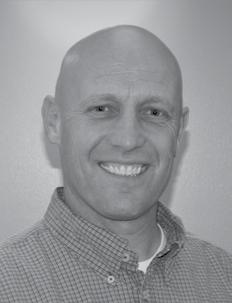
Our company, Gale Lim Construction, is a family operated business located just outside of Blackfoot. We specialize in heavy civil construction, rock crushing, mass excavation, and asphalt paving. We are privileged to be part of the AGC.
Sometimes, especially while driving, eastern Idaho seems like a long way from Boise. Yet, the Idaho AGC continues to do a great job representing and connecting all of Idaho. I appreciate the effort everyone outside the Treasure Valley makes to remain engaged and active in our association. For our Treasure Valley members, thank you for your continued efforts to improve construction in Idaho. We’re all in this boat together, and we’re stronger when we all take an active part in finding the best solution for our industry.
Of course, I couldn’t fulfill my responsibilities as President of the Idaho AGC without the support of both my immediate and extended family. It’s been
a privilege to be mentored by Gale Lim for the past three decades. I have grown just by being around him. I can honestly say there is no way I could accept the responsibility of leading the Idaho AGC without the skills and knowledge I’ve gained from Gale’s example and leadership.
Mentoring has been a key component in career development for each of us. We need to be diligent in coaching the next generation of construction leaders. I invite you to take a moment to reflect on the benefit your career has seen because of a mentor.
Now, determine the candidates you have in your circle that deserve the same opportunity. Mentoring is a very rewarding opportunity for you, the people you mentor, and your business. The future of your company and of our industry depends on it.
As we all know, our industry continues to face uncertainty and challenges. Yet, like many of you, I remain excited about the future ahead of us. I encourage all of you to remember the AGC is a powerful resource and, together, we can look forward to tackling what awaits us in the year ahead.
Thanks again for the confidence you have shown in selecting me to be our 2023 President. I am sure that with your continued help, it’s going to be a great year. l
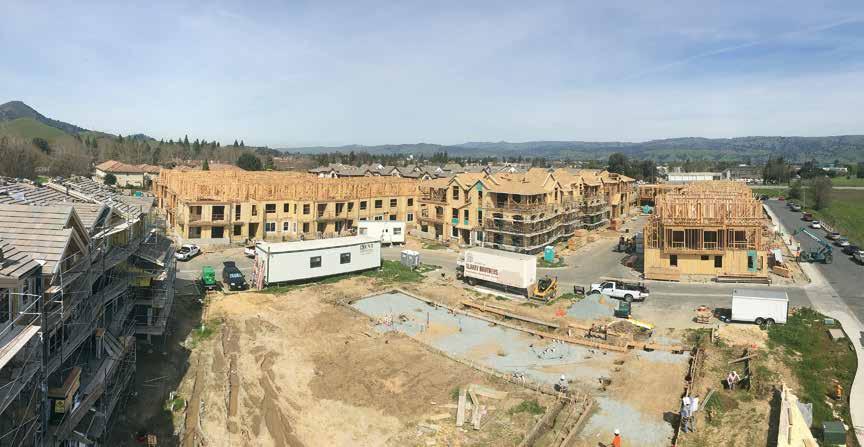
Lets face it, the construction world today is facing more challenges than ever. Pairing up with a reliable supply partner who will help you navigate the tight supply chain has never been more important.

IdaPac, or Idaho Pacific Lumber Company, has been helping supply construction companies, builders, and homeowners with the rough framing materials, engineered wood products, and wholesale building materials that they need since 1979. Our company is employee-owned, and each of our team members are passionate about ensuring you save both time and money with our building supply materials. Reach out to us today to learn more!
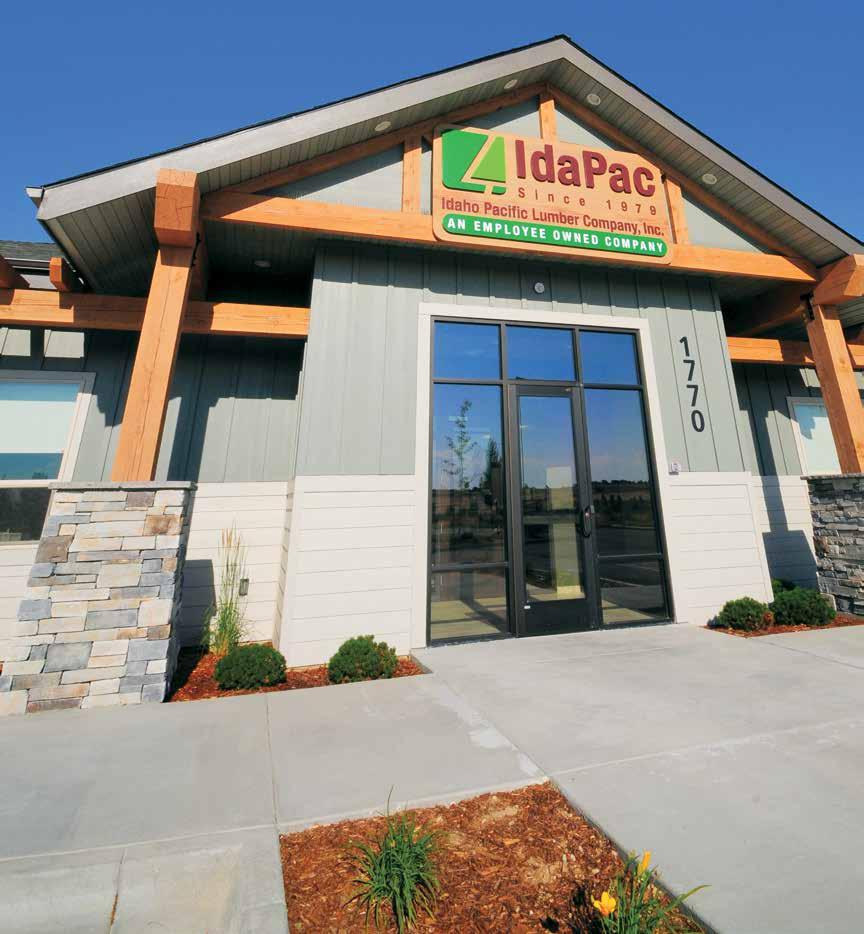
Rough framing materials | Insulation
Decking & Railing | Siding
Panel products | Metal & hardware
Engineered wood products | Specialty wood products

Crane mats | Doors and Cabinets
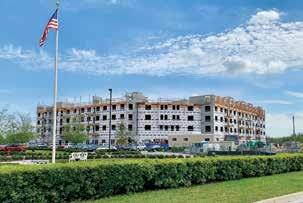

WAYNE HAMMON
Chief Executive Officer
whammon@idahoagc.org
(208) 344-2531
TAMARA TRACY
Senior Director of Finance & Operations
ttracy@idahoagc.org
(208) 472-0457
SUE FUDGE
Senior Health Plan Director
sfudge@idahoagc.org
(208) 472-0455
SEAN SCHUPACK Director of Government Affairs
sschupack@idahoagc.org
(208) 472-0464
GARY TACKETT
Membership Development Director
gtackett@idahoagc.org
(208) 472-0451
MOLLY JOHNSON Director of Workforce Development mjohnson@idahoagc.org
(208) 472-0466
HAILEY REYES Engagement Director
hreyes@idahoagc.org
(208) 472-0463
JENNY LARSEN Health Plan Manager
jlarsen@idahoagc.org
(208) 472-0454
DEREN MARTINEZ
Plan Room Manager
planroom@idahoagc.org
(208) 344-2531
KAYCEE CRON
Workforce Development Program Manager


kcron@idahoagc.org
(208) 472-0458
JULIA BECKLEY
Accounting & Administrative Specialist
jbeckley@idahoagc.org
(208) 472-0459
CASSIDY BOUGHTON
Social Media & Administrative Specialist
cboughton@idahoagc.org
(208) 472-0453

EXECUTIVE COMMITTEE
President Darrin Dance
Gale Lim Construction
1st Vice President Matt Blandford
Andersen Construction Company of Idaho, LLC
2nd Vice President Jared Wise
Interstate Concrete & Asphalt
Secretary/Treasurer Seneca Hull
Franz Witte Landscape Contracting, Inc.
Immediate Past President Anna Sparrell
CM Company, Inc.
GENERAL CONTRACTOR DIRECTORS
Tim Brown
Idaho Materials & Construction
Mike Burke
Concrete Placing Co., Inc.
Anthony Guho
Guho Corp.
Jeret Whitescarver
Engineered Systems, Inc.
Mark Elder
Sunroc Corporation
Tyler Resnick
McAlvain Companies, Inc.
Josh Davis
Granite Excavation, Inc.
Aaron Johnson
Bateman-Hall, Inc.
SPECIALTY CONTRACTOR DIRECTORS

Jake Claridge
Extreme Excavation, Inc.
Tracy Hopkins
Specialty Construction Supply
ASSOCIATE DIRECTORS
Jake DeBerg
United Rentals of Idaho
Darryl Simmons
Honnen Equipment Co.
Anna Sparrell
CM Company
Jessee Rosin Mountain Companies
Bob Von Lintig
Western Construction, Inc.
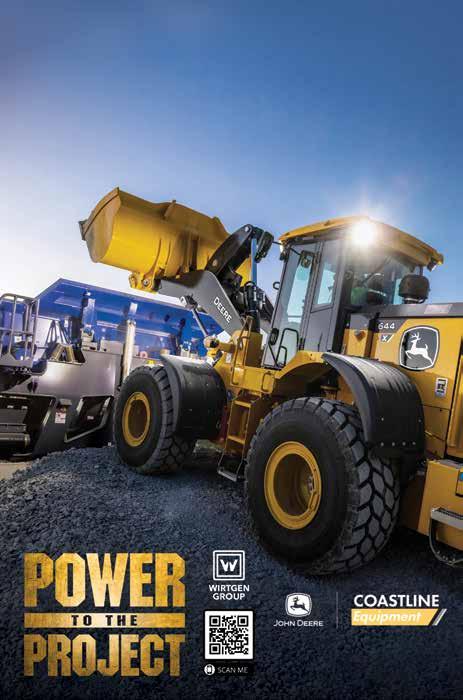
Zach Higgins
Wright Brothers, The Building Co.
Chuck Graves
McAlvain Companies, Inc.

Delwyn Mickelsen
Mickelsen Construction Co.
Joe Jackson
Engineered Structures, Inc.
Michael Arrington Starr Corporation
Garry Mattson Central Paving Co., Inc.
Paul Saucerman
Saucerman Construction
Burke Hansen
Hansen-Rice, Inc.
Pat McEntee
Central Paving Co., Inc.
Paul Franz
Interstate Concrete & Asphalt
Harvey Neef
Interior Systems, Inc.
Steve Heaton Western Construction, Inc.
Terry McEntee
Central Paving Co., Inc.
Scott Cron
Strata, Inc.
Jeremy Petersen
Petersen Brothers Construction
Paul Saucerman
Saucerman Construction
Joe Meuleman
Meuleman Law Group, PLLC
John Young
Young Construction Group
B UIL D T HE R OA D A HE A D WITH THE RIGHT EQUIPMENT
 By Hailey Reyes, Idaho AGC
By Hailey Reyes, Idaho AGC
With a record 757 attendees, the Idaho AGC’s 2022 Annual Awards Gala was a sight to behold. Members gather at this annual event for many reasons, including celebrating a year of hard work as an industry, networking with their peers, supporting the non-profit’s fundraising efforts and, of course, honoring award recipients.
Before announcing the first award recipient of the night, Idaho AGC Chief Executive Officer Wayne Hammon recognized the 10 Idaho companies who were honored for their commitment to
safety by the AGC of America. Those companies were Boise Steel Erectors, CM Company, ESI, Hansen-Rice, JC Constructors, Johnson Brothers Planing Mill, Railco, Rivers West Construction, STRATA, and Wright Brothers, The Building Company. These 10 companies set the standard for all of us to strive towards, with safety being job number one.
The first award of the night was the Member Service Award. This special category was created in 2008 to recognize the personal effort of an individual or company that has gone above and beyond in support of AGC members.
The 2022 recipient serves on the Idaho AGC’s Board of Directors but also chairs the membership forum.
“Over the past several years he has made it his personal mission to expand the AGC family and help ensure our continued success,” said Hammon while presenting Jake DeBerg of United Rentals with his award. “In doing so, he continues a long tradition of United Rental employees who are leading Idaho’s construction industry into a very bright future.”
The second award was presented by 2022 Idaho AGC President, Anna Sparrell of CM Company, and represents
all of those who, while not contractors themselves, work hard to ensure that Idaho’s construction industry continues to thrive: Associate Member of the Year.

“This year’s recipient is one of our most energetic promoters. Her enthusiasm and support of the Idaho AGC Health Plan during both the good years and some of the challenging times has helped turn the Health Plan into one of the bedrock benefits of AGC membership. A benefit
that, with the changes made this year, is ensured to have a very bright future,” said Sparrell. “While Delta Dental is a good partner, it is Joanna Ramer’s personal commitment to the AGC that makes that partnership so invaluable. We are honored to have earned her trust and thank her for her continued efforts on our behalf.”
The third award category of the evening was the Specialty Contractor of the Year

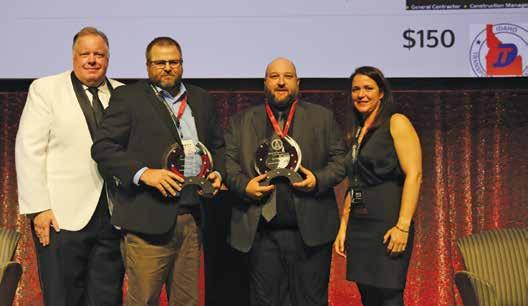
award. This award not only recognizes how important subcontractors are to the Idaho AGC, but also how essential they are to the construction industry.
“These trades are masters in their craft and are the cornerstone to any successful project,” noted Sparrell. “Tonight’s recipients are the owners of one of Idaho’s most trusted and rapidly expanding excavation companies. Almost everything we do in construction
starts with excavation. Excavators play an essential role in keeping our job sites safe and our projects on schedule. Extreme Excavation out of Jerome exemplifies quality control, efficiency, and pro-active management. Their continued excellence is reflected in their rapid growth and even faster-growing list of partners. It’s been a pleasure serving on the Idaho AGC Board alongside Jake Claridge. And while Jake is in Boise serving on the AGC Board and the Public Works Contractors Licensing Board, Craig Christiansen keeps their work on schedule and under budget.”
2023 President Darrin Dance then took to the stage to present two individuals with the President’s Cup award, an award given to recognize the current efforts or service by an individual to the Idaho AGC.
“Former Department of Commerce Director Bobbi-Jo Mueleman currently


serves as Governor Little’s top legislative aide. I’m told this is one of the most stressful jobs in the state capitol. Yet, Bobbi-Jo pulls it off with a smile,” Dance shared.
“Bobbi-Jo’s partner in crime is DFM administrator Dr. Alex Adams. Alex not only has the responsibility of balancing the state’s budget, but his team also reviews in great detail every single rule and regulation put forth by every single state agency. Together, these two all-stars have played a central role in not only passing Governor Little’s top priorities but also securing support for the AGC’s most important issues,” Dance added as he welcomed Bobbi-Joe Meuleman and Alex Adams to the stage to receive their President’s Cup awards.
While the President’s Cup award recognizes the current efforts or service given to the Idaho AGC by an individual, the capstone award of the evening is
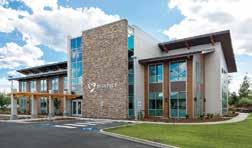
“Bobbi-Jo’s partner in crime is DFM administrator Dr. Alex Adams. Alex not only has the responsibility of balancing the state’s budget, but his team also reviews in great detail every single rule and regulation put forth by every single state agency. Together, these two allstars have played a central role in not only passing Governor Little’s top priorities but also securing support for the AGC’s most important issues.”
the S.I.R. Award, an award given in recognition of outstanding achievements by an AGC member, long-term dedication to the association, and/or lifetime achievement in the construction industry in general.
“The National S.I.R award is the highest award given by the AGC of America and represents a lifetime dedication to the three qualities emblazoned on our emblem – Skill, Integrity, and Responsibility,” Dance announced to an eagerly waiting audience.
“In the AGC of America’s more than 100-year history, tonight’s recipient is only the 30th Idahoan to ever receive one of these special awards. In light of his decades of dedication to our industry, his reputation for integrity, and his tremendous efforts on behalf of our organization and the thousands of hardworking Idahoans we employ, I ask you to stand and help me honor Bob Von Lintig with the AGC of America’s highest honor, the National S.I.R award.”
Keith Lewis, who has worked with Bob for 30 years in the industry and served alongside him on the Idaho AGC Education Foundation Board, said: “I think I speak for all of us on the Board, contractors, and students who may not know the impact you’ve had, when I say you have represented us well, and we are grateful and better because of you. Thank you for making a difference in our industry.”
Current colleague Garry Mattson added: “He certainly brought a changed culture [to our company] that’s more focused on safety and getting everyone involved in helping to look out for each other. You’re always looking to help somebody find a way to improve their lives, and that has resulted in improvement in the whole industry.”
Bob’s employer and President of Western Construction Inc. Steve Heaton rounded off the congratulations by

saying: “You are deserving of this award. You got nominated to get into the Idaho Construction Industry Hall of Fame. It isn’t given away to anybody. You have made the industry in Idaho better.”
As a final surprise to honor Bob’s achievement, his son Matthew took to the stage to present the award to his father. Congratulations to all our 2022 award recipients; we look forward to gathering
with the industry again next December (mark your calendar for the 14th) to honor more outstanding members.
Award recipients are nominated and selected by the Idaho AGC Nominating Committee. Candidates can be recommended for consideration by any member by contacting a member of the Board or Idaho AGC Chief Executive Officer Wayne Hammon. l
Each winter, the Excellence in Construction Partnering Awards recognize organizations within the construction industry who collaborate to achieve exceptional work.
“When we put forth the extra effort to be a good partner, we enhance safety, increase collaboration among stakeholders, and build higher levels of trust, all of which result in a better project being delivered,” said AGC Chief Executive Officer Wayne Hammon.
“The benefits of partnering include
enhanced teamwork efficiency and safer work zones,” added ITD’s Chief Operating Officer Dan McElhinney. “We want to celebrate the long history of excellent partnering taking place here in Idaho.”
Statewide and local construction projects are eligible for recognition, and applications for the awards are accepted each fall. To qualify, applicants should be able to demonstrate a project team of ITD and contractor employees stand out in their ability to resolve conflict, improve

communication on the project with all audiences, utilize innovative solutions, incorporate team building activities, honor stakeholders and, ultimately, achieve a common goal.
“We’re excited to be part of these awards and to celebrate the excellent partnering we’re seeing take place across Idaho,” Hammon said.
The Idaho AGC would like to congratulate the following award recipients that were recognized for their achievement in partnering In December 2022:

• Top Gold Award: District 1 and Knife River Corporation on the SH-3, Goosehaven Road to Round Lake Road project,
• Gold Award: District 3 and Concrete Placing Company, Inc. on the I-84, Northside Boulevard to Franklin Boulevard project,
• Silver Award: District 1 and M.A. DeAtley on the US-95, Granite North and Frontage Roads project,
• Silver Award: District 1 and J7 on the US-95, Labrosse Hill Street to Alderson Ln project,
• Bronze Award: District 6 and HK Contractors, Inc. on the SH-33, MP 100 to Beginning Realignment project,
• Bronze Award: District 4 and Knife River Corporation on the I-84, Declo POE project,
• Bronze Award: District 2 and M.A. DeAtley on the US-95, Thorn Creek to Moscow project.
• Gold Award: District 3 and Knife River Corporation on the SH-44 & SH-55, Eagle Road Intersection Reconstruction project,
• Silver Award: District 3 and Idaho Materials & Construction on the SH-44, SH-16 to Linder Road project,
• Silver Award: District 4 and Idaho
Materials & Construction on the SH-24 and SH-25 Pavement Replacement, City of Rupert project.
• Gold Award: District 4 and Idaho Materials & Construction on the US-93, Blue Lakes Boulevard; Poleline Road to Perrine Bridge project,
• Gold Award: District 3 and American Civil Constructors, West Coast LLC on the FY22 D3 Bridge Repairs project,
• Gold Award: District 1 and CL Heilman
on the FY21 D1 Bridge Repairs project,
• Silver Award: District 2 and Poe Asphalt on the Craigmont Business Loop, US95B/SH-62 project,


• Silver Award: District 3 and Knife River Corporation on the US-95, Pine Creek (Cambridge) Bridge Replacement project,
• Bronze Award: District 5 and Geneva Rock on the I-86 Pavement Preservation, Power County project.
• Silver Award: ITD District 1 and McMillen Jacobs Associates on the US95 Sagle to Long Bridge, Phase 1 project.
• Gold Award: Central Paving & ACHD on the Ten Mile Road, Victory to Overland project,
• Gold Award: Western Construction, City of Moscow, and LHTAC on the Mountain View Road Moscow Project,
• Gold Award: Debco Construction, Kidder-Harris HD, and LHTAC on the Selway Road, Idaho County Emergency Response Project,
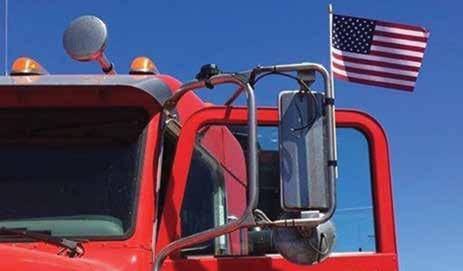
• Silver Award: Debco Construction, City of Genesee, and LHTAC on the Beech and Chestnut Street Reconstruction, Genesee project,
• Silver Award: Knife River Corporation, Nez Perce County, and LHTAC on the Gifford Reubens Road, Nez Perce County project,
• Silver Award: DL Beck, Inc., Madison County, and LHTAC on the West 5200 South Safety Improvements, Madison County project l
Idaho Based American Owned 208.721.2624
jason@americanvacservices.com
www.americanvacservices.com
American Vac Services provides hydrovac excavation, traditional excavation, concrete, and hauling, dump and transport services. We service both commercial and residential customers in the Wood River Valley, Treasure Valley, Boise and beyond, which include (but not limited to): underground utilties, trenching, demolition, hauling up to 50k lbs., heavy equipment transport, curb and gutter, sidewalks, footings, slabs, and stem walls.

The AGC Education and Research Foundation offers undergraduate and graduate level scholarships to students enrolled in ABET or ACCE-accredited construction management or construction-related engineering programs. Over $10 million in scholarships have been awarded to more than 4,000 students attending colleges and universities across the country. Only one student from Idaho was awarded with an AGC of America scholarship this year: Jaxon Wagner.

Jaxon is a construction management major at Boise State University and has served as President of the Construction Management Association and Boise State University Student Chapter of the Idaho AGC for the 2022-2023 school year. He is a team member of an Associated Schools of Construction competition team. He interned with the NRP group in Austin, Texas and his graduation date is spring of 2024.
Congratulations, Jaxon! We know your future is bright in this industry! l

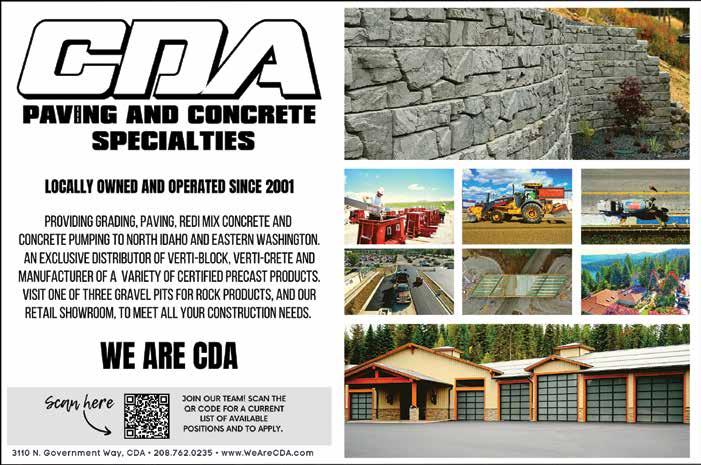
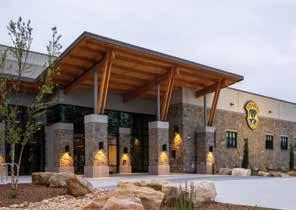


As Micron’s expansion in Idaho gets underway, residents and the construction industry are interested to learn more about the company’s commitment to supporting the unprecedented growth facing our state, why they chose Idaho, what their expansion could mean for the Treasure Valley and the United States, and more. Idaho AGC Chief Executive Officer Wayne Hammon was able to pose some of the questions on the top of all our minds to Micron’s Vice President of Procurement and Real Estate, Heather Baldwin.
Hammon: We all know that Micron has its roots here in Idaho, but it is now a multi-national company. What steps has the company taken to remain connected to its Idaho history?
Baldwin: Even though Micron is a large multi-national company, to me it doesn’t feel that way. It still feels like the small Idaho company that started in a basement of a dental office here in Boise over 40 years ago. I started with Micron 17 years ago and have been a part of the growth and pioneering spirit that exists, both in Idaho and in Micron.
As one of Idaho’s largest employers, Micron is a catalyst for the dynamic and innovative Boise community — one of the fastest growing metro areas in the United States. Since 2000, the Micron Foundation has provided more than $150 million to our global communities. Boise, the home of our global headquarters, has received a high percentage of these grants totaling approximately $90 million. We are proud
of the impact our grants have provided in Boise and throughout Idaho, particularly in the areas of STEM education. Some highlights include donating more than $68 million for the advancement of programs at the Boise State University College of Engineering, including the Micron Center for Materials Research and the Micron Academy for Inclusive Leadership and, most recently, partnering with Boise State to fund a $30,000 grant to their College of Education to place student teachers in Idaho’s rural districts and help address the teacher shortage. Last year, our investment in the Micron Student Success Center in the College of Engineering kicked off services to increase diversity programming and degree completion for all students. We have a strong history with all of Idaho’s major institutions of higher learning, including a $2.5 million gift to help build out the College of Western Idaho’s professional technical education center.
Hammon: Micron is one of the state’s largest employers. There must be some opportunities and obligations that come with that status. What are they and how does Micron ensure that it’s a good corporate citizen?
Baldwin: In addition to our plans to invest approximately $15 billion through the end of the decade to construct a leading-edge memory manufacturing fab in Boise, Micron will also continue to invest in the Idaho community, the place we’ve called home for over 40 years. As part of the company’s ongoing commitment to the Idaho community
and to building a diverse, highly skilled workforce, Micron will expand investment for K-12 STEM education programs, build on partnerships with community colleges and universities, and identify new ways to provide education and training to underrepresented and rural populations.
Through our Micron Gives initiative, our team members also can volunteer and donate to their favorite schools and causes with a matching contribution from the Micron Foundation. We are proud to say that over 78.5 percent of our team members participate in that program annually, and we gave more than 159,000 hours of our time and $6.8 million in team donations and matching funds. In 2022, our Micron giving programs combined to provide more than $12.8 million dollars to causes around the globe. Idaho was a big beneficiary of those efforts, including major grants to the Home Partnership Foundation (Idaho) to support the Campaign to End Family Homelessness in the Treasure Valley, the Discovery Center of Idaho, Big Brothers Big Sisters, Boys and Girls Clubs, universities, and more.
Micron is committed to our sustainability strategy for the design and operations of our new facility and, in line with our commitment to being a good corporate citizen locally and globally, Micron aims to achieve 100 percent water reuse, recycling, and restoration as well as use 100 percent renewable electricity at the newly planned facility in Boise. Additionally, the company plans to use green infrastructure and sustainable building attributes for the construction of
the new fab to attain Leadership in Energy and Environmental Design (LEED) Gold status. These efforts support Micron’s global target to achieve a 42 percent reduction in greenhouse gas emissions from operations by 2030 and net-zero emissions by 2050.
Hammon: With so much of the chip market taking place overseas, why has Micron chosen now to invest so heavily in its Idaho facilities? Why Idaho? How do you think the CHIPS act will impact the American chip manufacturing market?

Baldwin: The CHIPS and Science Act was passed to restore U.S. leadership in semiconductor manufacturing. Micron’s planned investment in Boise and New York, made possible by the CHIPS and Science Act, will increase the American share of global memory production from two percent to 10 percent and will shift 40 percent of Micron’s global memory output capacity to the U.S., ensuring a domestic supply of memory chips for national security, industrial, and consumer utilization. By significantly increasing the domestic production and secure supply of memory chips, Micron’s investments will support U.S. national security, economic security, and technology leadership, as well as support American innovation and competitiveness.
Micron’s legacy started in Boise, Idaho more than 40 years ago and today is home to our industry leading R&D facility. Following our U.S. manufacturing expansion, our long-established R&D facility in Boise will be co-located with the most advanced semiconductor manufacturing, which will support the pace of innovation that is needed for U.S. technology leadership. Additionally, locating Micron’s industry-leading DRAM production in the U.S. brings tremendous benefits for customers, enabling them to build their innovative products and solutions using a more resilient, secure,
and geographically diverse supply chain.
I think this focus on domestic memory manufacturing will help fuel growth for other U.S. companies outside of the semiconductor industry, supporting supplier expansion and creating benefits for the broader U.S. technology leadership.
Hammon: What excites you the most about this new project?
Baldwin: Having been with Micron for the past 17 years, it is always exciting
to see the company expand and to see the positive impact the expansion has on Idaho and underserved rural communities. Micron relies on a diverse and innovative supply base. Our inclusive procurement practices support Micron’s vision of enriching life for all by generating economic opportunities that further Micron’s impact on the Idaho community while delivering value to our business.

In each edition of Building Idaho, we will share a photo of a place, project, or piece of equipment. The first reader to identify it correctly will receive an Idaho AGC swag bundle, and be mentioned in the following edition. To identify this project, email Hailey Reyes at hreyes@idahoagc.org with your answer, name, company, and mailing address.
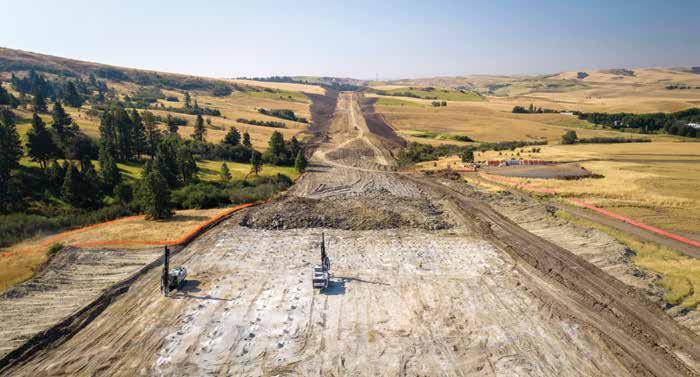

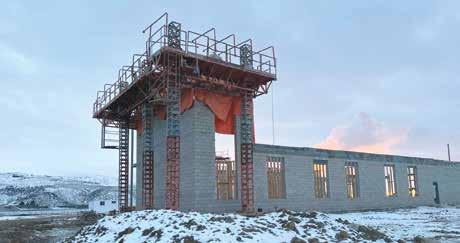
We stumped you! Nobody was able to identify last issue’s project, which was The Boardwalk mixed-use project underway in Garden City, Idaho. Better luck identifying this project!

We understand that customers have a choice who they do business with. We strive to build long term relationships through reliable, honest, and ethical services at a great value. We are a full-service company that can provide responsible solutions to all your environmental needs.








Coming into the 2023 legislative session there were many unknowns.
Despite spending much of 2022 getting to know new candidates through the primary and general elections, the sheer amount of turnover in both the Idaho Senate and House of Representatives (over 40 percent) generated a feeling of cautious optimism amongst our government affairs team.
Over the course of the past election cycle, the Idaho AGC’s PAC had contributed a record setting $100,000 in direct contributions to candidates who showed promise as business friendly, pragmatic leaders. In addition to the financial commitment, AGC members and staff got to know many of them, spending countless hours traveling the state to educate candidates on the current state of the construction industry in Idaho
and the challenges we face, building trust as the go-to resource when it comes to anything construction.
As we look back at the hard-fought successes of this year’s legislative session, it is easy to see that the effort paid dividends.
In fulfilling the advocacy mission of the Idaho AGC, our government affairs team is continually playing offense as well as defense. This year, the Advocacy Steering Group, made up of volunteer leaders from the organization, took positions on 42 pieces of legislation and assessed hundreds more. In addition to massive funding wins, we negotiated with utility companies to improve Idaho’s damage prevention statute and supported legislation that prohibits ESG from being used as a factor when awarding public works construction contracts.
We worked with numerous stakeholders, including the Governor’s office and others,
to secure nearly one billion (yes, with a “B”) in funding for both building and highway projects across the state and supported the passing of record investments in workforce development funding.
On the building side, the legislature allocated $300 million for deferred maintenance on state buildings. This funding builds off last year’s appropriation of $250 million and clears out nearly 60 percent of the one-billion-dollar backlog in deferred maintenance. Not only is this a prudent investment for the state’s future, it is also great work for building contractors. In fact, the contracts from last year’s pot of money have already been awarded to AGC members across the state.
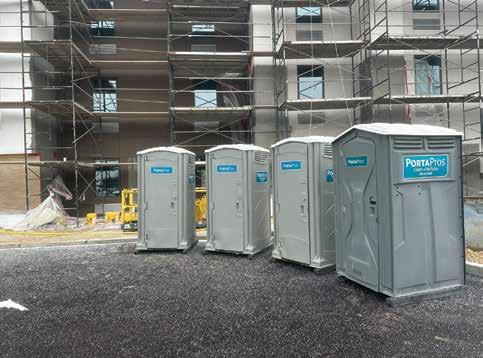
On the heavy civil side of the industry, we secured another $200 million to improve local bridges, $35 million for airport improvements, and $100 million to help local units of government facilitate the expansion of Highway 16.
Perhaps the crowning jewel of the session is the investments the state made this year in workforce development, our industry’s number one challenge. The passing of the Idaho Launch Grant Program will give eligible high school graduates an $8,500 scholarship to pursue an in-demand career education of their choice.
While numbers like those listed above often make headlines, much of our work never does.
In fact, we spend considerable time stopping well intentioned “good ideas” that would negatively impact the construction industry from ever becoming law. Many of
these are conversations that happen at the idea stage of a bill. Other times, it takes an all-out effort to stop legislation that would harm our members’ businesses.
This legislative session, we stopped bills that would create unnecessary liability for contractors with multi-occupancy bathrooms on site, an insurance bill that would have drastically increased costs for contractors that operate fleets, and a bill that would limit unemployment eligibility to just eight weeks and eliminate the “jobattached” status many of our employees rely on. And that’s just to name few – trust me, there were many others.
Lastly, the AGC supported a successful effort at the end of the legislative session to revise a complex property tax bill so that over $80 million a year in transportation bonding authority would not be jeopardized. This bonding is key to the billion-dollar investment in our state’s roads and bridged launched last year by Governor Little.

The success of AGC’s advocacy efforts is a product of the collective strength of its members and a testament to the strength of the AGC brand. Our thanks go out to all the members of our Advocacy Steering Group and others that
take their own time to volunteer and help guide the association through many of the difficult decisions that these efforts require. We are fortunate to have such a strong association and healthy industry here in Idaho.
Looking forward, we will continue to grow our advocacy efforts and are launching an effort this summer to look at ways to increase our PAC fundraising. If you would like to be a part of this effort or have any questions regarding advocacy issues, please reach out to Director of Government Affairs, Sean Schupack, at sschupack@idahoagc.org. l
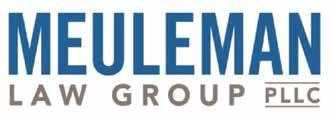
On the heavy civil side of the industry, we secured another $200 million to improve local bridges, $35 million for airport improvements and $100 million to help local units of government facilitate the expansion of Highway 16.
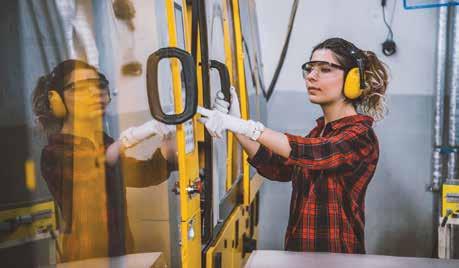
 By Idaho Workforce Development Council
By Idaho Workforce Development Council
The Idaho Workforce Development Council (WDC) was established in 2017. The Council consists of 37 members appointed by the Governor. The members
include 17 Idaho employers, 10 state government representatives, seven workforce representatives, a member from each chamber of the legislature, and a representative of the Governor. The Council
is distributed geographically and represents a diversity of different industry sectors including construction, healthcare, technology, aerospace, energy, finance, professional services, and advanced manufacturing.
Through its committees, programs, and collaborations, the Idaho Workforce Development Council helps connect Idahoans to career opportunities and Idaho’s employers to a qualified workforce. In many cases, these programs can help you attract, train, and retain employees. In this tight labor market, we know Idaho AGC member companies will want to take full advantage of these resources.
With the goal of increasing available
childcare for working families, the WDC Child Care Expansion Grants support businesses and employer consortiums to develop on-site or near-site childcare centers or partner with local and regional childcare services to expand childcare capacity in Idaho.
The deadline for FY23 grants has passed and all funding has been obligated for this round, but there are several grantees in need of contractors for grant activities.

An additional $15 million is requested in the FY24 budget for the WDC to continue to fund expansion of childcare so that Idahoans can get back to work. Should the WDC receive funding for another year, employer partnerships and contracting needs will be in high demand for grantees.
Needs for current and future grantees include design, bids, contracting, employer partnerships, and project specific construction work. Contact WDC for more information on potential collaboration or application information.
Idaho Connect is an online, interactive platform that builds bridges between education and the world of work, expanding lessons beyond textbooks to help students explore careers. Educators at schools request online sessions for their classrooms from employers, in Idaho and nationwide, allowing their students to connect “live” with industry experts. Employers build a window of opportunity to Idaho’s youth by providing sessions explaining their work environment and what they offer.
Idaho employers are able create content for classrooms to view that increases lineof-sight to careers for Idaho’s youth. Idaho employers will have the opportunity to virtually speak with classrooms throughout the state providing a real time view of their work environment.
Idaho Connect matches a professional’s

• Large or Small Commercial, Residential or Government Projects


• Installation of Underground Sewer, Water, Pressurized Irrigation, Storm Drain & Gravity Irrigation Utilities



• Clearing & Grubbing
• Mass Excavation & Grading
• Excavation of Concrete Foundations & Prep Building Pads

• Concrete Prep & Concrete
• Asphalt Prep and Paving
• Site Restoration
Taylor Landa (208) 800-8151 tlanda@centralcovellc.com
Dusty Painter (208) 817-1607 dpainter@centralcovellc.com
Committed to Safety, Quality Assurance, Customer Service, Integrity, Partnering & Team Participation
background, experience, and skills to classroom and curriculum needs creating meaningful virtual interactions with the next generation of workers, anywhere, anytime.
Build your employer profile page and start connecting with Idaho students at https://nextstepsidahoconnections. nepris.com/home/v4

In 2020, the WDC, in partnership with Idaho Business for Education (IBE), received a Youth Apprenticeship Readiness Grant to develop 400 Registered Apprenticeships for Idaho youth between the ages of 16-24, one of just 14 projects nationwide. The
Idaho Youth Apprenticeship Project is wholly funded by a grant from the U.S. Department of Labor in the amount of $2,490,630.
WDC and IBE have been charged with developing a statewide system to support youth apprenticeship programs. Regional staff have been deployed to assist employers and educators throughout the State of Idaho start Registered Apprenticeships in their communities, connecting employers to talent, and connecting youth with apprenticeship opportunities.
The Talent Pipeline Management Initiative (TPM) was created by the U.S. Chamber of Commerce Foundation and is led in Idaho by the Workforce Development Council. TPM is a scalable, employer-led solution designed to close the skills gap in ways that generate shared value and a return on investment

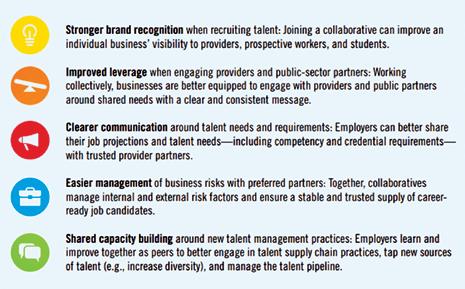
for employers as well as learners, education, and workforce providers, and the communities in which they reside. This systemic approach unlocks employer leadership and engagement in a novel way by speaking the language of – and leveraging strategies and practices associated with – supply chain management. TPM employers take the lead in building scalable, sustainable pipelines of talent. Cohorts are up and running in every region of Idaho and the WDC partners with Idaho AGC to facilitate the construction collaboratives.
Idaho LAUNCH is a program for all Idahoans to receive financial support for approved training. LAUNCH was created for Idaho residents who plan to use the benefit to work in Idaho for at least one
year after their training ends. LAUNCH provides each Idahoan with access up to $5000, a once in a lifetime maximum benefit.
Through a statewide survey in 2022, WDC asked Idaho employers from every region of the state to complete a detailed survey in which they identified the most relevant short-term skills that will help applicants be successful in their industries. There were 1,874 responses to the survey; four out of five employers plan to hire in the next year, and 57 percent of employers say the jobs they are hiring for require prior training. The top five industries that responded were construction, general business, healthcare, transportation and manufacturing, and hospitality/tourism. The survey helped WDC identify the in-demand skills currently needed throughout our state. Additionally, using
this data, we developed SKILL SYNC, a tool that allows jobseekers to match their current skills to employer needs, identify opportunities for professional development, and research specific courses to build their resume.
LAUNCH courses are updated regularly as new training becomes available. We have partnered with the Idaho Department of Labor to provide career planning to help job seekers find a quick path to the training they need at a cost they can afford.
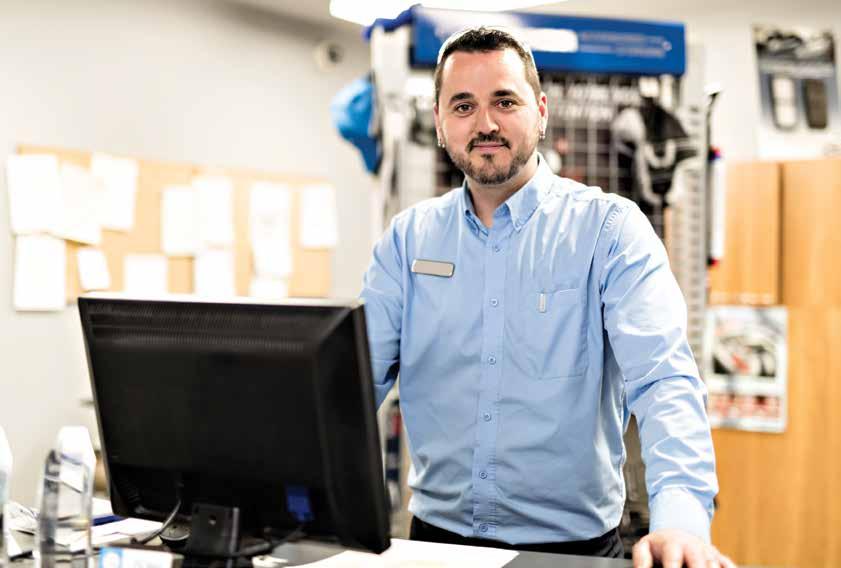
To learn more, visit Idaho LAUNCH at www.idaholaunch.com/.
For questions regarding the Idaho Workforce Development Council, please reach out to our communications and program manager, Sherawn Reberry, at sherawn.reberry@wdc.idaho.gov or 208-488-7564. l
According to author and speaker Simon Sinek, leaders with a finite mindset are more likely to have unmotivated employees, enjoy less cooperation, and use dishonest and unethical business practices. Organizations with an infinite mindset, however, tend to have vastly higher levels of trust, teamwork, and innovation.
In other words, your company’s mindset plays a huge role in its success. But how can you make positive, genuine improvements while still getting the most out of your people? At PortaPros, it was a matter of finding the right people.

With an infinite mindset, success is not measured by shortterm financial goals but by a longer-term vision that keeps the organization moving in the right direction — no matter who is on
staff. From its inception in 2019, our Nampa-based organization thrived with this mentality but eventually hit a plateau. Without a clear, easy solution, we needed to look inward as a business to improve. That’s when we implemented the Entrepreneurial Operating System (EOS), which helped us clarify our vision and focus on our people. The results were eye-popping: our revenue quadrupled.
To get here, we worked for roughly a year after enacting the EOS to define our vision, values, and brand. We determined that our brand is our culture, and our culture is our people — which starts with the hiring process.
The EOS allows you to look honestly at the team you have in place to ensure your values are aligned and that each person is in
the “right seat” for them. It wasn’t a fool-proof or easy process; we hired, we fired. We moved people from position to position. In the end, though, alignment led to happy employees who are the right fit for us and embody what our company represents.
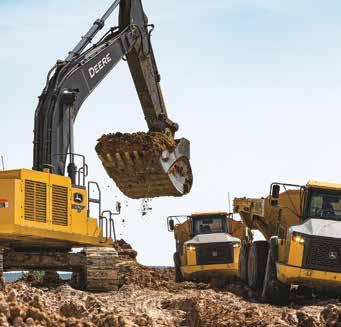
Our next step was to develop accountability. Each role in our company, including leadership, has a measurable and specific scorecard tied to their responsibilities, which are shared with our team. For example, our customer scorecards track each customer interaction and are sent weekly to our company and leadership team for discussion during our L10 leadership meetings.
Our most valuable measurables are internal: employee net promoter scores (eNPS), quality conversations, and turnover rate. These give us insights into how our people are doing. The eNPS is a quarterly survey that allows our team to anonymously provide feedback to our company. To spark camaraderie, our leadership team discusses quality conversations they’ve had with team members so that other members of leadership can follow up, whether they’re planning a vacation or discussing their kids’ school play. These quality conversations allow us to get to know our team members more intentionally.
Our final measurable is our employee turnover, currently at 14.5 percent. According to Paylocity, the industry average is 65.5 percent. We have found that when we put our people first, the revenue follows — which is reflected in our key measurables.
Aside from employee measurables, your company will also need to track your “Rocks” and implement an IDS (Identify, Discuss, Solve) system. Rocks are time-based priorities (90 days or yearly): we review them weekly and update our team on the status. IDS is a tool to overcome the obstacles blocking us from our Rocks by finding the topic, person or task that needs to be discussed to move forward. All our IDS-based conversations include vulnerability, trust, and collaboration to find the best solution.
The goal of all of this is to create a workplace where employees have a voice and take pride in their work. At PortaPros, we don’t have the best workplace culture in the country, but we do have one that’s intentional and thriving. We owe that to our infinite mindset and the EOS model — thanks to them, we found the right people, and you can too. l
To spark camaraderie, our leadership team discusses quality conversations they’ve had with team members so that other members of leadership can follow up, whether they’re planning a vacation or discussing their kids’ school play.
Concern surrounding inflation, increasing interest rates, and worker supply are driving uncertainty regarding market conditions, leaving contractors to wonder “what can the industry expect for the remainder of 2023 and beyond?”
The outlook for the construction industry is a particularly relevant concern for companies in Idaho.

Construction makes up a large portion of Idaho’s economy – contributing $6.1
billion (5.6 percent) to the state’s $110 billion economy in 2022. Compared to other states, Idaho’s construction spending as a share of state domestic product was fourth largest.
Population increase has been a major contributor to construction sector growth in the state. Idaho had the highest population growth rate of any state for five years in a row and was a close second to Florida in 2022, with a growth rate of 1.8 percent.
Population growth has led to demand for
housing, which is evident by the uptick in multi-family permits. Multi-family permits in Idaho grew by 38 percent in 2022 and, given the ongoing influx of residents, this segment will likely continue to be a source of construction growth in 2023.
Aside from multi-family housing, other areas of growth include infrastructure and civil engineering – related to expansion in roads, bridges, public transit, ports, and airports. Federal funding and grant money coming from the Bipartisan Infrastructure
Law will continue to drive demand. These programs are estimated to provide Idaho with $2.2 billion in formula funding for highways and bridges through 2026. In addition, Idaho can compete for billions of dollars of funds under the law’s many new grant programs.


In addition, Micron is revitalizing its U.S. operations and, in late 2022, announced plans to expand its microchip plants in Boise. The U.S. will be less dependent on foreign locations for critical supply chain inputs and Idaho will likely see increases in industrial plants, office buildings, gas plants, and parking lots that are directly and indirectly linked to Micron’s expansion in Idaho.
As of February 2023, seasonally adjusted construction industry employment in Idaho totaled 69,200, an increase of 7.1 percent from one year prior and the second-highest employment level, after January, in the history of the series, which dates back to 1990. Construction
employment in Idaho grew much faster than U.S. construction employment, which increased three percent from February 2022 to February 2023.
Construction employment increased between February 2022 and 2023 in most of the state’s metro areas. According to the Bureau of Labor Statistics, over the last year industry employment increased by nine percent in Pocatello, six percent in Boise City and Idaho Falls, and five percent in Coeur d’Alene. Employment remained unchanged in the Lewiston metro area (which includes Clarkston, Washington).
Wages have also been rising in Idaho. The average hourly earnings for Idaho’s private sector employees rose 6.7 percent year over year in January 2023. Construction, however, outpaced the private sector, growing 12.6 percent over the same period. The industry’s wages have maintained an upward trajectory since well before the pandemic–-but with wages rising across the board, there is concern
whether construction wages can attract enough qualified and available workers needed for anticipated projects.
In response to the question posed at the beginning of this article – what can the industry expect in 2023 and beyond – the simple answer: continued growth.
There is expected growth coming from federal dollars provided by government programs such as the Infrastructure Investment and Jobs Act, Chips Act, and Inflation Reduction Act.

Private financing will nonetheless remain important for Idaho’s construction industry, as well as public sources. There is little reason to expect that private sector financing would not be available to work in partnership with developers and entrepreneurs to support the type of construction that a growing population will need.
While there is concern around labor supply and financing options, Idaho’s outlook is positive. l
The Economic Impact of Construction in the United States and Idaho
Economic Impact of Construction:
• In Idaho, construction con tributed $6.1 b illion ( 5.5%) of the state’s GDP of $111 b illion.
• There were 909,000 construction establishments in the U.S. in the 3rd quarter of 2022, including 11,800 in Idaho. (An establishment is a fixed business location; about 99% of construction firms have only one establishment.)
Construction Spending:
• Nonresidential spending in the U .S. totaled $888 billion in 2022 ( $534 billion private, $355 billion public).
• Residential construction spending in the U.S. totaled $910 billion ($442 billion single-family, $105 billion multifamily, $354 billion improvements, $9 billion public).
• Private nonresidential spending in Idaho totaled $2.0 billion in 2021. State and local spending totaled $1.2 billion. (Totals are not available for residential, railroad, power, communication, or federal construction . )
Construction Employment ( Seasonally Adjusted ):
• Construction (residential + nonresidential) employed 7. 9 million workers in February 2023, an increase of 228,000 ( 3. 0%) from February 2022 and an increase of 3.8% from February 2020, the peak pre -pandemic month.
• Construction employment in Idaho in February 2023 totaled 69, 200, a n in crease of 4,600 ( 7%) from February 2022 and an increase of 14, 300 or 26% from February 2020.
• Contractors are having trouble filling positions, impeding the industry’s recovery. In the January 2023 AGC -Sage Business Hiring and Outlook Survey, 80% of firms had a hard time filling salaried and hourly craft positions.
Construction Industry Pay:
• Construction jobs pay well. In Idaho , 4 out of the 5 most numerous construction occupations had median annual pay exceeding the median for all employees in 2021. (Half of workers earn more than the median; half earn less.)
$0 In thousands Median Annual Pay for Selected Construction Occupations in Idaho, 2021
$ 37, 550 $ 36, 550 $ 47,710 $ 48,420 $ 37, 840 56,180 $ 60, 140


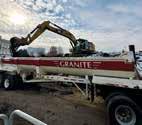
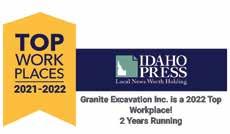



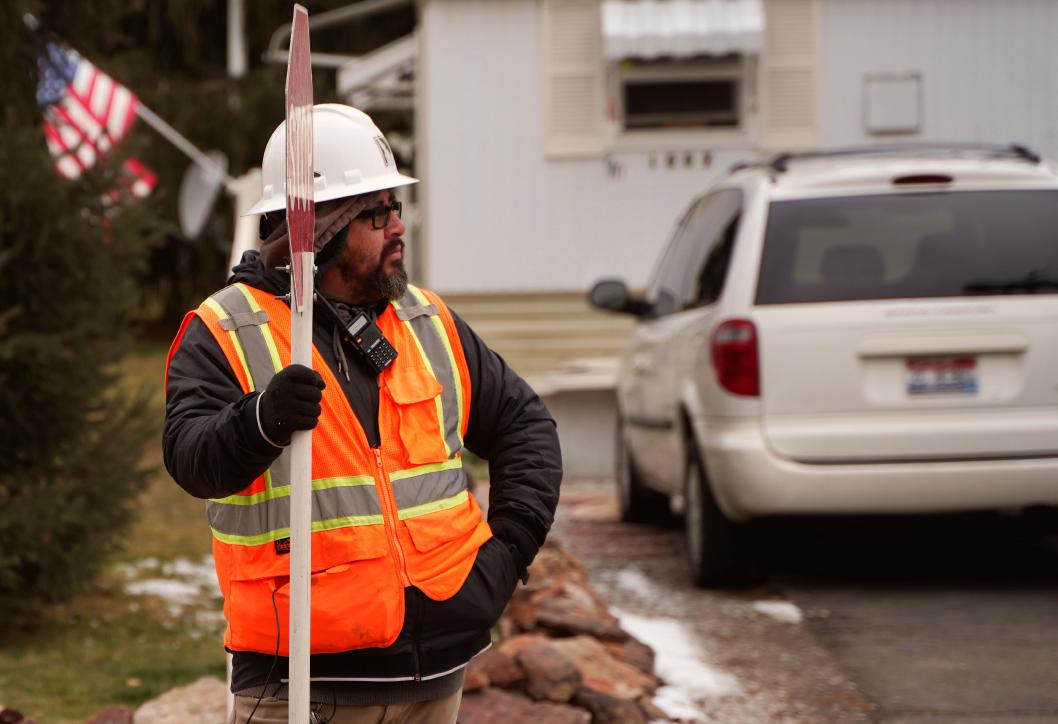
ARNIE WAGNER: Idaho isn’t a secret anymore. It seems that the entire world is beating a path to our door. Is this a good thing?
CHUCK GRAVES: We’re in an industry that relies on growth as a big part of our business plan, but I don’t think any of us sitting in this room were expecting the growth we’ve seen over the course of the last several years. While growth in and of itself has a positive impact on our industry, I think the way it has been heaped upon us for the last four or five years is not really positive. In my view, this rapid growth has created an inflationary bubble over the Treasure Valley that is making it difficult for private businesses to come here and make their business plans work.
ZACH HIGGINS: Growth has brought a lot of pressure within the municipalities. Just trying to get through the permitting process has added a ton of time and cost to each project. And if you are

a private developer coming into the area and wanting to get a multi-family development put up, that extra time and money impacts the metrics the project was built around. It also puts pressure back on the contractor. We spend a lot of time preparing cost estimates and then, by the time you get approval, everything has changed.
One of the hardest challenges of growth for us is from the staffing standpoint. Trying to allocate the appropriate resources and time with a constantly moving target is obviously a day-to-day challenge that we must move through.
CHUCK GRAVES: Just like Zach said, the time to get permits and approvals has quadrupled over the course of the last several years. That has a significant impact.
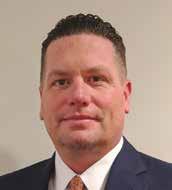
BRYCE PARKER: Now, more than ever, so many things are out of our hands. And the hard part about that is you
can’t even plan for it because you can’t get accurate information from the local jurisdictions. You are forced to wait around until you hear from them and then try to react. Contractors have to prepare owners for these circumstances, but doing so can turn them off to the whole market. Sure, we’ve been handed a lot of lemons, but trying to get your hands on the water and the sugar necessary to make the lemonade is getting tough.

TIM BROWN: Cities and counties have consistently struggled when it comes to infrastructure, but when you see yearover-year growth like we’ve seen in the Treasure Valley for the last eight years, they have fallen even further behind. All this growth puts pressure on the existing infrastructure, which then puts pressure on the funding mechanisms used to ensure there is money for

• Arnie Wagner
• Tim Brown – Vice President – Idaho Materials & Construction

• Chuck Graves – President – McAlvain Companies, Inc.
• Zach Higgins – President – Wright Brothers, the Building Company
• Bryce Parker – President – Beniton Construction
repairs and maintenance in addition to the need for new roads and bridges. Luckily, Governor Little and the Idaho Legislature have provided additional funds for all types of infrastructure improvements.
But increased funding doesn’t help us find the people necessary to put the projects in place. Even though we have a growing population in the state, our industry continues to struggle with finding skilled labor. We have more work to do and fewer resources to get it accomplished.
CHUCK GRAVES: When you look at the size and scale of some of the projects happening in Idaho, you have to think that the pressure on our workforce is only going to increase. Right now, Idaho is doing well and things are slowing in other parts of the country. This will focus even more attention on Idaho. That’s going to be stacked on top of the tremendous amount of growth we’re already seeing.
ARNIE WAGNER: I would imagine that each of you struggles with deciding which projects to take on given the limits you have on time and talent.
CHUCK GRAVES: Every company has a different business model that best fits their company. Each has to look at the
opportunities out there and determine if it is a good fit for the type of work they do. This hasn’t changed, but what has changed is the supply and demand of construction management professionals. The cost of living in Boise is not the same as it was five years ago, so recruiting people into an environment like this can be challenging, not to mention just retaining the people you already have onboard when someone is offering more pay to move a block in one direction.
ZACH HIGGINS: You can spend a lot of time in developing an individual you think is going to grow within your company, and then out of nowhere you get the right hook and they are recruited away by a competitor. I have to wonder if it is truly sustainable. With the wage inflation that is taking place, what
happens when the model fails? What happens when the work doesn’t come at the current pace? We could have a lot of people move out of Idaho because they are accustomed to the financial lifestyle.
BRYCE PARKER: The best scenario is the change happens incrementally. Just like fuel prices, it’s never going to drop back to where it once was, but the market will adjust to what’s sustainable.
ZACH HIGGINS: I graduated right in the middle of a recession. I was thankful to even have a job that kept me in Idaho. So, I think with the compression that’s going to happen, there may be pay cuts and people will have to choose if they want to remain in Idaho. By the time it may happen here, it is possible there will not be the option to move to another market for better pay. Everyone will have
to make that decision for themselves. Hopefully, if we do the right things in keeping our industry sustainable, it won’t come crashing down entirely.
JEFF SYKES: How does Idaho’s remoteness impact your ability to find the skilled professionals you need to do the work? Are there enough people in Idaho to get the job done?
TIM BROWN: I know that the AGC has an aggressive workforce development program, but I think each of our companies is now looking at recruiting and retention differently than we did five or even two years ago. It seems the new generation isn’t as interested in construction as they are in tech or socialization with other people, so there are things about our industry, like the hours or the physical demands, that isolate a large portion of the younger generation.
BRYCE PARKER: I think some positive things are happening. Just the swell of new or expanded CTE programs across Idaho has been nice to see, but we’re investing in kids that will not be viable construction workers for 10 or 15 years down the road.
CHUCK GRAVES: Our challenge is to find a way to make the industry more accessible to everyone. How do we get more immigrants into construction? How do we get more farm kids into construction? How do we get more women into construction and engaged in our business model?
ARNIE WAGNER: Switching gears, are contractors still dealing with supply chain issues?
BRYCE PARKER: Oh man. The hardest part of the ongoing issues
with the supply chain is we have had to engage on so many projects much earlier than normal to try and get the electrical packages and HVAC packages and other long lead items purchased and manufactured. You’re not going to start the project for another six or nine months because you have to coordinate when the equipment will arrive.
CHUCK GRAVES: We all sign agreements every day that we will deliver a project within a given number of days. When we have no control over our supply chain, those contractual components become very difficult to follow. The owners have a perception that the contractor has control over all these factors, but we simply do not. So, it’s becoming more and more difficult to negotiate a tenable contract.
TIM BROWN: That applies to civil equipment as well. You have to place your orders early if you want to purchase large equipment because there are only so many build slots and they’re typically spoken for before they leave the factory. And it’s just not the big stuff. Everyone has come to depend on “just-in-time delivery,” but now we are stocking replacement parts because you just can’t afford to be down two weeks waiting for a shipment.
JEFF SYKES: Are there any positives to what you are experiencing?
CHUCK GRAVES: I think the biggest positive of this whole situation is the increase in collaboration between the construction side and the engineering and design side. If we aren’t working together, these projects are not going to be successful. All of these different entities must work together. This is changing the way we deliver projects.
If everyone isn’t together from day one, that project, in my view, is going to have a very hard time being successful.
BRYCE PARKER: I agree. From day one you are having conversations with everyone. Owners, designers, suppliers, and subcontractors all have to be at the table and working together. Like Chuck said, especially in a guaranteed maximum price contract, you have to get everyone nailed down and working together. Before, you could work on a 50 percent set of drawings and throw enough contingency in that you settle on a price that everyone’s comfortable with. That’s not the case now.
ARNIE WAGNER: Do you perceive it getting any better any time soon?
BRYCE PARKER: I think it has to. I mean, the situation at the ports has already gotten better. However, I’m worried we could have a train wreck on the trucking side. The trucking companies are under so much pressure with new environmental regulations. They are also facing the same staffing shortfalls we are and the AB-5 law in California may be laying a foundation to further regulate independent truck drivers at the federal level.
CHUCK GRAVES: It is going to get better because everyone is starting to figure out how to work in this new world. It’s not that the pressures are going to change, but contractors will adapt to the new way of doing business.
WAYNE HAMMON: Can we talk about something more positive?
ARNIE WAGNER: Okay, Wayne. Each of you had succeeded in this market. Is there a best practice you would be willing to share with your competitors?
BRYCE PARKER: Communication. That’s where it all starts and stops. You just have to lay it out there and share what you know with everyone. Owners, design teams, your employees, your trade partners. Everyone has to be working together and constantly communicating.
TIM BROWN: One of our company values is character. I think if you have good character, it can get you through a lot of bad situations. It also helps you succeed in good times as well. I think people want to do business with people who have good character. If you follow through with what you say you are going to do, then down the road you gain people’s respect. That’s how relationships are built.
ZACH HIGGINS: Focus on relationships, both internal to your company and externally. In the market we are in, we must constantly tend to the relationships we have with our employees. They are the key to our success and we must be vigilant in caring for our relationship with each one of them.
TIM BROWN: I would also add innovation to the list. We’ve talked about the way we look at labor. I think the key to solving this difficult problem is to continue to innovate. Think of Blockbuster. They had a corner on the market and didn’t want to change and Netflix wiped them out, and big.
BRYCE PARKER: I agree with Tim, but we must partner innovation with attention to the fundamentals.
JEFF SYKES: The last question is what advice would you give to a younger, less experienced version of yourself?
CHUCK GRAVES: This is a tough one. Having been in this industry now for going on four decades, which is hard to even come out of my mouth, the basic tenants of what we do every day are not that different than when I started. Construction is one of the most complicated business models on the planet. We do this for margins that most companies would look at from a risk profile and say, “are you crazy?” Yet we do it every day. The key is to focus on problems early. Our management team focuses on foresight, planning, and being prepared for any scenario. It’s hard to get away from the daily troubles of a construction project because they are so numerous, but if you take the time to plan ahead of time, you will have the tools you need to succeed.
BRYCE PARKER: If I were to go back and talk to myself at 22, I would tell that kid to trust his instincts and never stop learning.
CHUCK GRAVES: You are not going to last long in this business without good instincts.
TIM BROWN: I think I would tell myself it’s important to focus on people.
Whether they are your employees or your customers or your peers, it’s the people that are at the center of our business.
ZACH HIGGINS: My message to a younger me would be to trust your gut and enjoy the ride.
BRYCE PARKER: As complicated and risky as the construction business is, there’s still nothing I think I would rather be doing.
ZACH HIGGINS: Yeah.
CHUCK GRAVES: That’s the great thing.
TIM BROWN: Absolutely.
BRYCE PARKER: I mean, I may want to be a stock car driver, but being a contractor is a very rewarding experience.
WAYNE HAMMON: There is a lot to that. I’m not a contractor, but I get to bask in your respective glow. The fact that you are doing something you love and actually build something is amazing. It’s great to hear you all say that despite all these challenges, it is still what you want to do. It means a lot. l
WE
The
(208) 593-4401
sstayner@tpgrp.com
Partners Group is your single resource for employer benefit services. Lighten your workload by partnering with a team who knows employee benefits, wellbeing consulting, retirement planning, and more. thepartnersgroup.com
One of Idaho’s largest dairies is partnering with Shell Oil Products U.S. to make something useful out of waste.
Shell is building digesters at two Bettencourt Dairies in Wendell to turn cow manure into renewable natural gas that will enter a local pipeline and be used to fuel vehicles.
Bettencourt’s part of the deal comes naturally.
“Our part of it is to provide manure for them — and we’re good at that,” said Bettencourt Dairies Chief Financial Officer, Rick Onaindia.
The digesters are the size of football fields, he added. Production at the first
facility is expected to start later this year.
“It’s absolutely an enormous project,” said Idaho Dairymen Association Chief Executive Officer, Rick Naerebout. “The biggest digester in the state.”
Digesters on dairies have become increasingly popular in recent years as California and other states have passed stricter emissions regulations, Naerebout said.

The digesters capture methane released by the decomposing manure for use as renewable energy, cutting down on harmful emissions from the manure itself, and reducing the demand for fossil fuels.
The agriculture sector is the largest
source of methane emissions in the country. Dairy farms with digesters can reduce their methane emissions by 85 percent each year, Boise State Public Radio reports.
In Idaho, there are about 650,000 milk cows, and dairy is the state’s top agricultural commodity, according to the Idaho Farm Bureau Federation.
Naerebout estimates there are about half a dozen digesting facilities on Idaho dairies, with more on the horizon.
“Overall, there’s a significant reduction in the greenhouse gas footprint of the dairy operation,” he said.
Bettencourt Dairies is a family-owned
The two facilities at Bettencourt Dairies are projected to produce a combined 900,000 MMBtu a year of renewable natural gas — the equivalent of 8.1 million gallons of gasoline, according to U.S. Department of Energy figures.
operation that’s been in business for 42 years, Onaindia said. They have eight dairies across Jerome and Gooding counties.
Shell will own and operate the renewable natural gas facilities at two Bettencourt Dairies and staff them with a handful of operators. Bettencourt is leasing Shell the land and will provide the manure, or feedstock.
The project is a significant investment in a rural Idaho community, Naerebout said.
The first site alone required 14,000 yards of concrete, said Josh Mavencamp, owner of Idaho-based Mavencamp Construction, whose team is working on both sites.
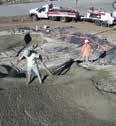
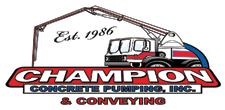
“I think this digester is a win for the community, and it’s a win for the dairy, too,” Mavencamp said. “We’re taking a byproduct that’s essentially labeled as waste and making something out of it.”
Once in production, the biogas will go to the pipeline, and the processed manure will go back to Bettencourt to use as fertilizer and bedding for the cows.
“It helps contain the odor. It cooks the organics out of the manure,” Onaindia said. “It’s better for field application and better for crops. From the dairy standpoint, it’s really a natural and logical extension of our business.”
The two facilities at Bettencourt Dairies are projected to produce a combined 900,000 MMBtu a year of renewable natural gas — the equivalent of 8.1 million gallons of gasoline, according to U.S. Department of Energy figures.
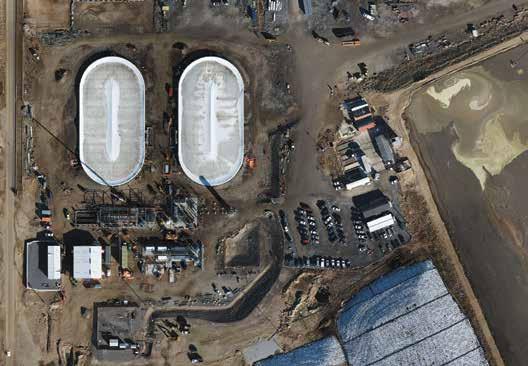
“We’re taking the waste off our system and putting it to work,” Onaindia said. “I think it’s a tool, you know. It’s not the answer by itself, but it’s a good step in the right direction.” l
Shell is building facilities on two Bettencourt Dairies in Wendell, Idaho, to convert cow manure to renewable natural gas.

First facility: Shell Downstream Bovarius
• Bettencourt Dairy #1
• Estimated 24,000 cows supplying feedstock

• Construction started in late 2021
• Two anaerobic digesters
• Production target: 400,000 MMBtu a year of renewable natural gas, projected starting in late 2023 or early 2024
Second facility: Shell Downstream Friesian
• Bettencourt Dairy #7
• Will estimate to have 20,000 cows supplying feedstock

• Now in early phases of construction
• Will have two anaerobic digesters
• Production target: 350,000 MMBtu a year of renewable natural gas. One MMBtu of natural gas is equivalent to about nine gallons of gasoline, according to the U.S. Department of Energy.
Shell Oil Products U.S. is a subsidiary of Royal Dutch Shell. Its net carbon footprint targets are forecasted for a 10-year period.
the Concrete Counts, Call Champion!”
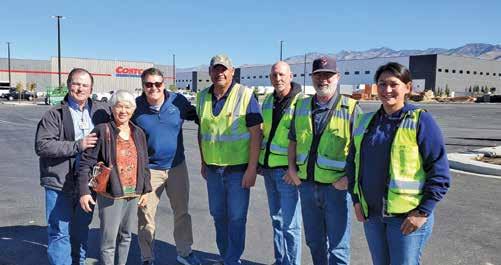 By Holly Beech
By Holly Beech
On any given day on a construction site in Southwest Idaho, you may find a tall, thin man wearing a white hardhat sorting through recycling bins.
His name is Bill Jackson, but he goes by “Action,” which suits him. He’s been collecting and selling recyclables since he was a kid growing up near Boston in the 1940s.
For the past two decades, his efforts, alongside his wife, Jackie, and a wide network of partners, have turned scrap metal into scholarships for students.

The initiative is called the Idaho Youth Education Recycling Partnership, or iYERP, supported by Pacific Steel & Recycling. The proceeds go toward the John William Jackson Fund, named for
the couple’s youngest son, John, who lost his life in a rock-climbing accident in 2000 when he was 24 years old.
The fund helps other students in Idaho and surrounding states finish college and do things John loved doing — music (John played the trumpet) and outdoor activities (John played soccer at Centennial High School in Boise and traveled the West with the Boise National team).
“He was kind of a Renaissance individual,” Action said. “He was a handsome guy — didn’t get the looks from me — and he was smart like his brother, they both went to Georgetown… He was outgoing, he was likable, he was fun to be around.”
In launching the fund, Action said he wanted a tangible way to raise money rather than approaching foundations that
get asked for money all the time. A former construction guy himself, Action saw potential in recyclable materials from job sites that often end up in a landfill.
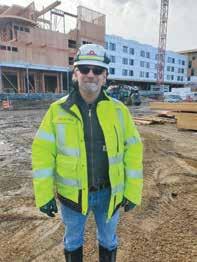
He and Jackie had no idea just how big this would get. The fund is now just shy of reaching the $2-million milestone.
That money has made the difference for students in the Treasure Valley and surrounding region in finishing their nursing degrees. It has given kids the opportunity to see Ballet Idaho and Opera Idaho, play an instrument, and join a club soccer team.
At almost 81 years old, Action still spends several hours on job sites almost every day, sorting the recyclable material to be sold.
“Sometimes I’m doing all this work and I say, ‘Action, why are you still doing
this?’” he said. “But then, you know, once you have the opportunity to hear the students… Many of them just said, ‘hey, if they didn’t get their $2,000 scholarship, they might not have been in a position to ultimately get that degree.’”
The fund has been so successful because of the partnership with Pacific Steel and a wide network of construction companies.
“It just seems to be a natural fit,” said Brian Whipple, Principal at Summit Wall
Systems Inc. in Meridian, which typically has eight to 10 job sites partnering with iYERP each year.
“They make it easy for us to help them,” Whipple said. “Without iYERP, unless there was a readily available way to recycle, which there normally hasn’t been, it would just go into the trash dumpster at the job site with other waste materials.”
That’s a big part of Action and Jackie’s mission: creating a culture of responsible metal recycling.
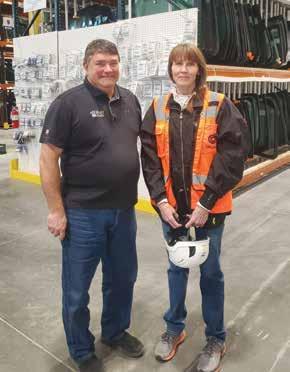
“We try to get these contractors to be outstanding environmental stewardship
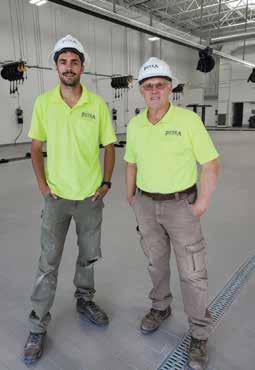
leaders, which means keep the metal out of the landfill, don’t send hazardous waste to the landfill,” Action said.
Pacific Steel provides the recycling bins and transports the materials to be sold at its locations. All the proceeds go into the John William Jackson Fund.
With larger jobs — such as the Costco Wholesale that’s being built in Billings, Montana — iYERP can raise about $2,500, Action said. If there’s also an agreement with the electrical contractor, that number goes up.
into scholarships for students. Over the past two decades, the fund has distributed nearly $2 million and has prevented scrap metal from ending up in the landfill. You can help them raise $45,000 to reach the $2-million milestone by:

The Idaho Youth Education Recycling Partnership – iYERP – turns recyclable materials
• Donating cash or recyclable metal from job sites
• Volunteering to help harvest material from job sites Partners include the Idaho AGC, Pacific Steel & Recycling, and over 45 general contractors and companies. To learn more, contact Bill “Action” Jackson at iyerp2010@gmail.com. Donate directly to the John William
Fund donation page on the Idaho Community Foundation website: https://bit.ly/JWJFund.
“It’s a good cause and we’re more than happy to help with it,” said Jake Griffin, Pacific Steel’s Assistant Manager in Boise. “(Action) is all for it. His heart and soul are in it.”
Vice President of Operations Brian Hetmer with CM Company, one of iYERP’s first partners, remembers the early days.
“It started off with just a pickup truck and him showing up rooting through our
trash,” Hetmer said playfully. “Now it’s a fully functioning operation.”
The partnership helps CM, too.
“It’s not going to the landfill, so that’s good for everybody… and we’re not paying to have it disposed of by the trash companies,” he said.
Wayne Hammon, Chief Executive Officer of Idaho AGC, recently put out a call to action to help iYERP close the $45,000 gap to reach the $2-million
milestone, whether through cash donations, donated materials from job sites or volunteering. Idaho AGC is a proud sponsor of the program, he said, and many members are involved.
“We encourage everyone else to get on board and help in whatever way they can because of all the good work that they do and young people that they support,” Whipple with Summit said. l
• St. Luke’s facility at 27th St. & Fairview Ave., Boise
• West Point Dairy Plant, Hyrum, Utah
• Boise Airport Parking Expansion
• Costco Wholesale, Billings, Montana
• Bluebird Express Car Washes
• Owyhee High School, Meridian
• Idaho Central Credit Union
• Primary Health
• Amazon Distribution and Fulfillment Centers
• Trios Southridge Hospital, Kennewick, Washington
• GPS machine control models for Trimble and Topcon
• Highly accurate earthwork takeoffs using the latest and greatest softwares including Trimble Business Center, Agtek, and Autocad Civil3d



• Assistance in project estimates by providing material quantities
Middleton, Idaho 530-514-2820
arek@borchardtct.com

borchardtct.com

In our industry, it is no secret contractors are an integral part of their communities. The leaders of our companies don’t stop being leaders when they clock off; they are active, involved, and committed members of the community, serving on nonprofit boards, coaching youth sports, and volunteering their time at local schools. In short, our industry is dedicated to making Idaho the best place to live, work, and raise a family.
Idaho native Matt Morgan is one of those leaders. Born and raised in Idaho Falls, Morgan built a highly successful design and construction business from the ground up. Morgan Construction was a proud member of the Idaho AGC before merging with a larger member company, facilitating Morgan’s ability to fully focus on an entirely different passion: preventing and reducing child sexual abuse by increasing sex-offender accountability (in other words, increasing
convictions through systemic change to how these cases are prosecuted). No small lift.
After 30 years of silently dealing with the traumatic effects of childhood sexual abuse, Morgan sought both answers and justice. His decision to speak out and confront his abuser makes him a rare statistic. Research shows that one in 13 boys and one in four girls experience this type of abuse. Yet, Morgan is among the few who share about it. With a burly build and strong calloused hands, Morgan’s physical presence is that of a man who has earned a living through rigorous labor. He speaks from his diaphragm, with power behind his voice.
“When you are sexually abused as a child, a piece of you is taken. For all intents and purposes, it changes everything about your life,” said Morgan. He isn’t alone in his delayed disclosure either: only 14 percent of people will ever
report their abuse, and for those who do, the average age of disclosure is 52. This is because, like Morgan, many experience dissociative amnesia and post-traumatic stress disorder.
In court, Morgan proved his abuser groomed him and a jury unanimously decided in his favor. This resulted in the first instance in legal history that a civil case was won on the grounds of fraud by grooming. It was a game-changing moment. This is because, despite its prevalence and lasting devastation, 94 percent of reported child sexual abuse cases will never end in a criminal conviction. Only six percent do. This is a lower conviction rate than any other criminal activity. Delayed disclosure, the statute of limitations, and corroboration beyond a reasonable doubt make conviction immensely difficult. In most cases, there is no “hard” physical evidence, no eyewitnesses, no crime scene, no

confession, and no offender cooperation. When multidisciplinary teams lack specialized knowledge on tackling such cases, it overwhelmingly means no prosecution. Those cases that do go forward face insurmountable challenges with complex and volatile trials that are highly traumatizing for children.
After his success in the courtroom, Morgan and his family understood the power of what they had just accomplished and the importance of sharing this information with others. They founded Building Hope Today (BHT) as a 501(c)3 non-profit in 2015 to do just this. BHT provides tactical training and technical assistance to multidisciplinary teams on specific methods and tools for identifying,


investigating, and prosecuting their most challenging child sexual abuse cases. This includes training prosecutors, detectives, forensic interviewers, medical providers, social workers, counselors, victim advocates, victim witness coordinators, and school resource officers. BHT focuses on corroborative “soft” evidence within the seven stages of grooming, which 93 percent of offenders use to manipulate and control their victims’ silence. This unique strategy squashes the predominant “delayed disclosure” and “he-saidshe-said” defenses, and it provides corroboration beyond a reasonable doubt to secure a criminal conviction. This is important because offenders never stop at just one. Seventy percent of offenders
“I am so grateful to the IAGC for highlighting Building Hope Today. I had the idea years ago about a fundraising campaign called Builders Building Hope where construction companies in Idaho would join us in this fight to save children from lifelong trauma. Let’s have the Idaho construction industry be a shining-light example for all States in leading this country out of this silent epidemic that fuels suicides, addiction, crime, incarceration, depression, anxiety, PTSD, and so many other mental health problems in our communities. These abuses are the biggest breakdown in a healthy society because, without support, damaged children grow into damaged adults with long-lasting effects. Abuse causes a breakdown in social and fiscal dynamics of the community that replays itself, over and over, until we, as a community, make the hard decision to say no more! I humbly ask that you speak up and speak out, step up with your company names, and put your hard-earned money on the table with us. Let’s protect our innocent children and heal the wounds from these insidious abuses against them.” Learn more about Builders Building Hope here: www.buildinghopetoday.org/BBH
harm between one to nine children, 20 percent hurt 10 to 40 children, and 10 percent harm more.
BHT specifically targets rural areas to deliver its tactical training and technical assistance, creating teamwork across multiple counties and jurisdictions. While Ada County has a large enough population to allow specialization in casework, rural areas do not have the capacity for fulltime, specialized investigative teams to focus solely on child sexual abuse cases, and funding for training is often limited. BHT brings the program to these jurisdictions and delivers it free of charge to create tremendous impact. As one prosecutor said, “[BHT’s] training provided a new way of examining cases. I had detectives talk to me about cases we’re working on together, saying, ‘We can do this differently... We can add this... I can ask this question...’ We’re looking at future cases and cases we could have done better if we had this knowledge previously. It was important for our multidisciplinary team to receive this training and to receive it together.”
What is the long-term impact? As more multidisciplinary teams receive this training, more offenders are held accountable, and more harmed children understand the abuse was not their fault–they were groomed and manipulated. This changes victims’ psychological and emotional perspectives, giving them a voice and setting them on the path toward healing. The Idaho Governor and Attorney General’s 2023 report agrees: “… we must provide adequate funding, training, and equipment for our law enforcement officers and prosecutors on the front lines of the battle against child sexual abuse. Idaho’s children deserve no less.”
BHT is doing important work, and they need our support.
“There are three primary ways the community can help: funding, prevention, and discussion,” said BHT Executive Director Faye White.
1. Funding. “Donating is one of the greatest pathways to supporting our mission. As a nonprofit, the more funding we receive, the more training we can deliver, and the greater our impact becomes,” White said.
2. Prevention. Teach your children about personal safety and empower them to speak up. When is the right time? Now. Be aware of the seven stages of grooming as a parent or community leader. Ninety-three percent of children are abused by someone they know and trust. Their offenders will use these grooming and manipulation tactics.
3. Discussion. One in four girls and one in 13 boys experience sexual abuse. Eighty-six percent will never tell. Of those who do tell, the average age of disclosure is 52. Many of them experience trauma while not understanding where it comes from. Understanding the source can be vital to speaking up and seeking help.
“I spent my teens flunking school and getting into trouble,” Morgan said. “I was angry, frustrated, and confused. I tried to escape my destructive path by moving to California. When I got down there, I found that set of nail bags and that hammer. I found a purpose. It made me feel good about myself. I was good at it. I gave it everything I had, and threw myself 100 percent into it and it became my craft.”
Since speaking about his past, Morgan has been approached countless times on the construction site by his peers, who share their own stories of abuse and subsequent personal challenges, ones they haven’t spoken about before. It is a fact that mental health issues plague the construction industry. Our industry has the second highest rate of suicide in the country, according to a recent study by the Centers for Disease Control and Prevention. Fifteen percent of all construction workers have a substance abuse disorder, according to American
• 1 in 4 girls and 1 in 13 boys will experience sexual abuse.
• Stranger danger does not usually apply – 93% of children are abused by someone they know.
• 70% of predators harm 1 to 9 children, 20% hurt 10 to 40 children, and 10% harm more.
• 86% of children never tell.
• 94% of offenders are never held accountable.
• Think this doesn’t apply to you? Think again. Child sexual abuse is a community crisis. It occurs at every socio-economic level, across ethnic and cultural lines, in all religions, and at all levels of education.
Grooming means deliberately establishing an emotional connection to target a child for sexual abuse. It involves:
(1) identifying and targeting the victim; (2) gaining trust and access; (3) playing a role in the child’s life; (4) isolating them; (5) creating secrecy around the relationship; (6) initiating sexual contact; and (7) controlling the relationship.
Addiction Centers, compared to the 8.6 percent of the general population.
The uncomfortable conversations need to happen. The more open we are about this subject, the less isolated those who experience this type of abuse will feel; more voices will speak up, education can happen, and change and healing can finally occur. Morgan’s story needs to be shared. Look at your work crew. If you have 13 or more men working on your job site, chances are at least one will have had an experience like Morgan’s, and they may need to hear they are not alone. There are resources and support available to them. They have options.
“I finally had a voice after all these years of misunderstood frustration, fear, and
anger that allowed me the opportunity to find peace and true happiness in every bit of my soul and being,” Morgan said. “I hope for this second chance in life for all those who have experienced that same horrible experience I did as a child.”
As contractors, we build and lead our communities. Child sexual abuse is a silent epidemic, and we don’t talk about it. But that doesn’t mean it’s not happening. We all have an essential role to play.
“Together, we can make a difference and mitigate these crimes against our children,” Morgan said. “We all can build hope, today.”
To be part of the systemic change, find resources and donate, please visit www.BuildingHopeToday.org. l
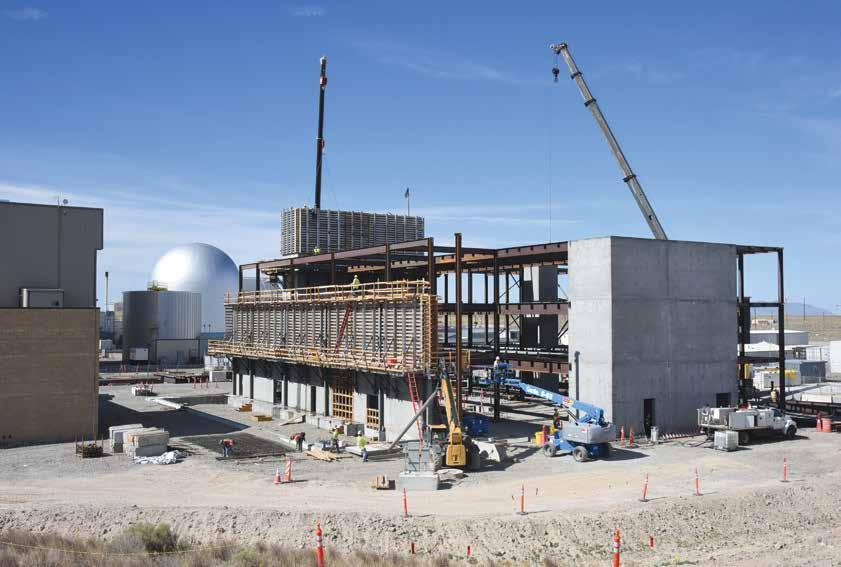 By Jeremy Johnson, Small Business Program Communications Liaison
By Jeremy Johnson, Small Business Program Communications Liaison
Idaho National Laboratory (INL), a U.S. Department of Energy research center in eastern Idaho, is experiencing significant growth as the lab focuses on clean energy and infrastructure protection. INL is receiving funding from the Inflation Reduction Act and additional internal investments, resulting in plans for several new buildings and upgrades to INL’s aging infrastructure. This growth provides opportunities for construction companies throughout the state to
expand into eastern Idaho.
INL will receive over $100 million from the Inflation Reduction Act designated for the Advanced Test Reactor and the Materials and Fuels Complex. Over the next three to five years, these funds will be used for new office buildings, warehouses, and maintenance buildings to support the nuclear mission at these two facilities. The lab will also focus on improving infrastructure such as roads, grounds, and utilities around the INL site.
In this time frame, INL will also invest
millions of dollars from internal funds for additional upgrades and improvements. INL anticipates having 14 major projects underway by the end of this fiscal year, creating near-term subcontracting opportunities.
“To help us accomplish multiple projects, we need to develop new relationships with a variety of contractors new to the Advanced Test Reactor and INL, both large and small, who can assist in filling in gaps and supply quality products and services,” said Long-Term
Asset Management Division Director at the Advanced Test Reactor, Heath Buckland.
For INL, the goal is to maintain current supplier relationships as well as work with new suppliers to meet mission milestones.
“Working with Idaho National Laboratory can be a benefit to businesses looking to diversify their portfolio or enter government contracting,” said INL Small Business Program Manager, Stacey Francis. “It’s a good source of stable, meaningful work in support of national priorities.”
To support these large ongoing projects, the expansion of INL’s mission space, and its partner industries, INL continues to invest in the state of Idaho and the region. Recently, INL helped develop the Eastern Idaho Workforce Training Center, which is managed by the College of Eastern Idaho and located in Idaho Falls. The center is equipped with several classrooms and nine high bay facilities to help employers looking to work in eastern Idaho train their current or future workforce.
“As INL continues to grow, it is critical that we help the region manage the impact to the local economy and workforce,” said Workforce and Economic Development Programs Manager, Hope Morrow. “INL is committed to continuing to support and develop the regional workforce at all levels while simultaneously uplifting our regional economy and communities.”
Construction companies interested in supporting INL must be signatory to the site labor agreement and need to maintain an active registration in the System for Awards Management and the INL Vendor Portal. For more information, please contact INL’s Small Business Program Office.



Battelle Energy Alliance manages INL for the U.S. Department of Energy’s Office of Nuclear Energy. INL is the nation’s center for nuclear energy research and
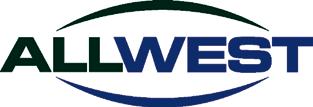
development and performs research in each of DOE’s strategic goal areas: energy, national security, science, and the environment. For more information, visit www.inl.gov. Follow us on Twitter, Facebook, Instagram, and LinkedIn. l

In the Northwestern United States, Dasco of Idaho has established itself as a trailblazer in the realm of utility contracting. Companies like Dasco of Idaho rely on a robust network of suppliers and dealerships to complete projects successfully and, in a recent development, one of their key suppliers of industrial equipment, Vermeer Mountain West, just got stronger. Vermeer Mountain West announced their merger with neighboring dealer group Vermeer Northwest, creating an alliance that will amplify their ability to serve utility contractors like Dasco of Idaho with unparalleled efficiency and support.
At the close of 2022, Vermeer Northwest merged with and adopted the name of Vermeer Mountain West. This merger formed a contiguous network of 13 locations spanning much of the western United States. By joining forces, both dealership groups aim to bring equipment expertise and market knowledge to their combined region. Leadership from both dealership groups will continue to be engaged in the business.
Kyle Pieratt, President and Chief Executive Officer of Vermeer Mountain West, shared his enthusiasm for the merger, stating: “We are excited to continue building out the Vermeer Mountain West brand as we strive to deliver excellence for our customers. This merger leverages our ability to scale customer service, inventories, and long-term career pathing for our team members in the fast-paced and growing markets we serve. Competing at
scale is vital for sustainability well into the foreseeable future, and we are committed to this journey with our customers and team members!”
Utility contractors like Dasco of Idaho stand to benefit immensely from this alliance, as it will deliver comprehensive solutions tailored to their needs. With their combined resources, the united Vermeer Northwest and Vermeer Mountain West will provide state-of-the-art equipment, responsive service, and technical acumen. This collaboration exemplifies the spirit of partnership in pursuit of excellence, a testament to the value of unity and synergy in driving the utility contracting industry forward.
Dasco of Idaho recently aided in the relocation of utilities on the new Franklin Road to Karcher Interchange project and the 20/26 highway widening project, demonstrating their ability to handle complex projects and deliver outstanding results. Dasco of Idaho, based in the Gem State, offers a diverse range of services such as trenching, plowing, and directional drilling. These services facilitate the installation of cable, fiber optic, power, natural gas, sewer, and water lines for utility companies operating throughout the Northwest.
The merger of Vermeer Northwest and Vermeer Mountain West further strengthens this alliance, promising an even brighter future for utility contracting in the northwestern United States. l
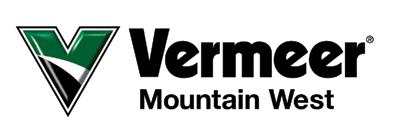




The construction industry is known for being one of the most hazardous industries to work in. In fact, according to a United States Bureau of Labor Statistics (BLS) report in 2021, there are close to 150,000 injuries on construction job sites annually. While one would like to assume that safety technology is advancing in some ways, the number of injuries in construction annually is still trending

upwards. Between 2011 and 2019, the number of construction site injuries increased over 41 percent, meaning that the dangers of the building industry don’t seem to be lessening anytime soon. Though these injuries vary in type and severity, the fact that so many occur should be a good indication of how much construction professionals risk their health and safety every day.
As employee benefit consultants, we are regularly asked by our construction industry clients what can be done to leverage their health insurance benefits to aid in mitigating their workers’ compensation risk. Here are some ways that companies in the construction industry can use their health insurance benefits to decrease their workers’ compensation risk factor:
Wellness programs are becoming increasingly popular in the workplace, and for good reason. These programs can help employees make healthy choices and lead a healthier lifestyle, which can lead to a decrease in workplace injuries. For example, companies can provide smoking cessation programs, weight loss programs, and stress management programs. These programs can help employees reduce their risk of chronic diseases, which are a leading cause of workplace injuries.
2.
Onsite health clinics can be an effective way for companies to provide their employees with access to healthcare services. By providing employees with access to healthcare services, companies can help employees address health issues before they become serious, which can lead to fewer workplace injuries. For example, onsite health clinics can provide vaccinations, first aid, and preventive care services.
Ergonomic assessments can help companies identify ergonomic risk factors in the workplace. By identifying ergonomic risk factors, companies can implement changes to the workplace that can help reduce the risk of workplace injuries. For example, companies can provide ergonomic chairs, workstations, and tools to reduce the risk of musculoskeletal disorders. Sprains, strains, soreness or pain accounted for over 35,000 non-fatal construction injuries resulting in days away from work, with over one third of those instances relating to back injuries (BLS 2021).
4.
Mental health issues can affect employees in any industry, but they are
especially prevalent in the construction industry due to the high-stress nature of the work. By providing mental health services, companies can help employees manage their mental health and reduce the risk of workplace injuries. For example, companies can provide access to counseling services and mental health resources.
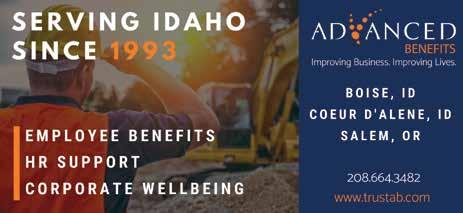
Education is an essential component of injury prevention. By educating employees on injury prevention, companies can help employees understand the importance
of safety in the workplace. For example, companies can provide training on proper lifting techniques, how to use equipment safely, and how to identify and report hazards in the workplace.
When reviewing your employee wellness strategies for 2023 and 2024, consider the tools and resources available to you in the employee benefits package you could leverage to foster a safer and healthier workforce. In many cases, they are tools and resources that are already paid for as part of your employersponsored health plan. Keep in mind all the moving parts to build a better and safer workforce (construction pun intended). l
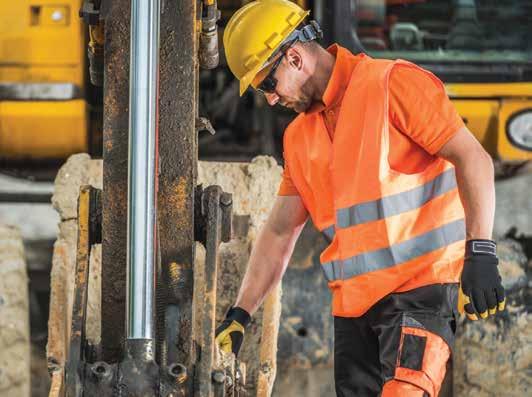
The Inflation Reduction Act (IRA) increased the potential benefit of several energy efficiency tax incentives. These include the Section 179D energy efficient commercial buildings deduction and the Section 45L new energy efficient home credit. These changes warrant a renewed look at these incentives by companies looking to build or remodel real property.
The IRA’s stated goals include reducing carbon emissions and encouraging domestic energy production and manufacturing. The law introduces and expands existing tax incentives available for those investing in clean energy projects. It also increased the time horizon for these incentives, in many cases by up to 10 years.

Many tax credits and incentives available have limited time horizons, often requiring annual renewal by Congress. This has
caused uncertainty about their benefits, especially in industries where projects typically take multiple years to complete. With the extension of these incentives for the next 10 years, that uncertainty is eliminated and developers can build these incentives into project costs for the foreseeable future.
New Energy Efficient Home Credit (IRC Sec. 45L) A $2,000 credit per single family residential housing unit. Available to multi-family developers, investors, and construction companies that build energy efficient properties sold or leased through Dec. 31, 2022. Increased to $2,500 per unit under Energy Star and $5,000 per unit under the Zero Energy Ready Homes program from Jan. 1, 2023 through Dec. 31, 2032.
Energy Efficient Commercial Buildings Deduction (IRC Sec. 179D) Deduction

available to building owners for installing qualifying energy systems. The deduction can be up to $1.88 per sq. ft. through Dec. 31, 2022 and increases up to $5.00 per sq. ft. beginning in 2023 if the project meets prevailing wage, and apprenticeship requirements. See below.
Real estate and construction companies should discuss these incentives with their tax advisors who can connect them with experts to determine project feasibility. These professionals, usually engineers, evaluate a company’s projects and consider incentives that are likely applicable. The study can be used to make businesses decisions about next steps.
A feasibility analysis can follow five simple steps:
1. Consider the project’s goals. Look into intended investments your company plans to make for its building project.
2. Split investments up into distinct groups. Section off relevant investments into qualifying and nonqualifying categories.
3. Match investments to potential IRA incentives. Compare the list of planned investments with the list of available tax incentives and determine overlap.
4. Conduct a cost-benefit analysis of implementing a tax incentive. Calculate the degree of investment required to achieve eligibility and the return on investment the tax incentives would offer.
5. Identify requirements to substantiate claims to incentives. Pull together the documentation required to prove existing or intended adherence to tax incentive requirements.
A key hurdle to qualify for these incentives are the prevailing wage and apprenticeship requirements. Companies must pay workers wages and benefits that meets standards for their geographical area set by the government. A certain portion of the labor on each project must also be performed by certified apprentices. It is important to understand these requirements before beginning a project. A feasibility study could include an analysis of these requirements and whether adjustments would be required to meet them.
These incentives have often been overlooked by taxpayers and practitioners alike due to their relatively minor potential benefits and complex rules to navigate. However, after the “remodel” of these incentives in the IRA, many companies will see an increase in potential benefits. We recommend reaching out to your CPA if you think a project in your pipeline could qualify for one of these incentives. l

Harris CPAs was built from the ground up over 25 years ago, starting with strong roots in the construction community. Now as the largest independent CPA firm in Idaho and with five offices throughout the state, we have the resources needed to help you tackle complex situations, all while working with construction professionals local to you. Let us help you ensure that today’s planning efforts create success for tomorrow.

Many tax credits and incentives available have limited time horizons, often requiring annual renewal by Congress. This has caused uncertainty about their benefits, especially in industries where projects typically take multiple years to complete.
A-Built Construction
Alder Sales Corp.
All Valley Fire Inspections & Services Inc.
Blue Wrench
Borchardt Construction Technology LLC
BTB Institute
Budget Blinds
Burks Excavation Corporation of Idaho
Butte Fence Inc.
Cloudburst Irrigation and Landscape Inc.
CMCI, LLC dba Conveyored Materials
CMYK Grafix Inc.
Cole Industrial Inc.
Dalrymple Construction Services
Datum Tech Solutions LLC
Disaster Response
Evenflo Heating & A/C
Fence Unlimited Inc.
Four Rivers Excavating LLC
Gaia Earthsmithing LLC
Gen 7 Construction LLC
GEO-97
Green Services Inc.
GreenAcres Hydroseeding
H & S Company LLC
HMH Engineering
IMAGINiT Technologies
Integrity Surety
Iron Mountain Rebar
Johnny on the Spot Environmental
Kendall Auto Idaho
Kirt the Painter
Know-How Construction Services
Konstanty Services LLC
Koyle’s Classic Construction
Larsen Law PLLC
Master Environmental Inc.
MC Painting
Mickelsen Equipment LLC
Milwaukee Tool
Munger Roofing and Construction LLC
Northwest Grading, Inc.
NXB Geo
Pappas Pumping and Septic Services LLC
Payette River Electric & Controls
Petra Inc.
PG Long LLC
Plenium Builders
Probst Electric Inc.
Reading Truck
Rock Placing Company
Rocky Mountain Amusements
Rustic Wood Floor Supply
Shannon & Wilson Inc.
Signs By Tomorrow
Sompo International
Southern Construction & Installation
Steelhead Garage Doors
Superior Blasting Inc.
Swinerton Builders
Titan Excavation & Construction Inc.
Treasure Valley Rebar
Treasure Valley Solutions
Triple J Excavation LLC
Truss Craft of Montana
Veritas Facility Services & Construction
Wall to Wall Construction
Wealth Management Associates
West Star Construction LLC
Wolff Services - Corporate Housing
WRS Inc.
Zelham Inc. l
Please join us in welcoming these new members, who have joined the Idaho AGC since the last issue of Building Idaho.


With incentives to help save energy and money.
Idaho Power has the resources to take your business to the next level:
• Our business prices are 30% below the national average.

• Clean hydropower is our largest energy source — and we’ve set a goal to provide 100% clean energy by 2045.
• We o er cash incentives for businesses of all sizes who design and build facilities with energy e cient technologies, systems and strategies.



idahopower.com/business

